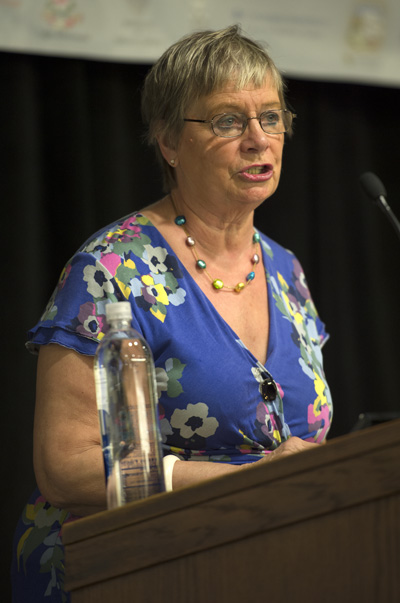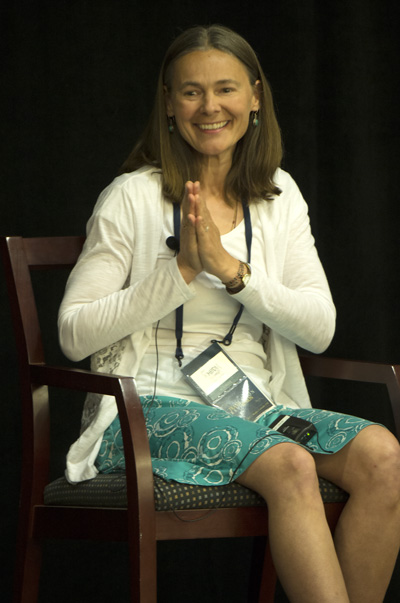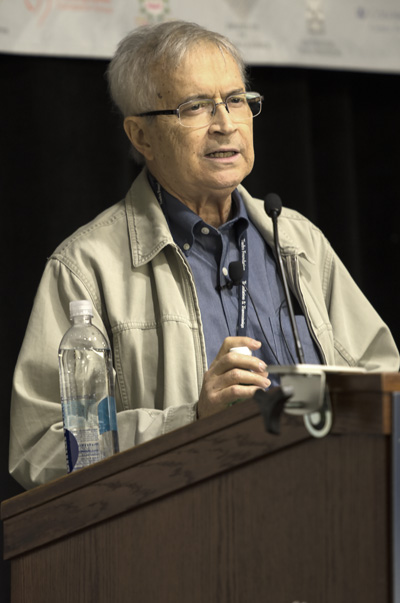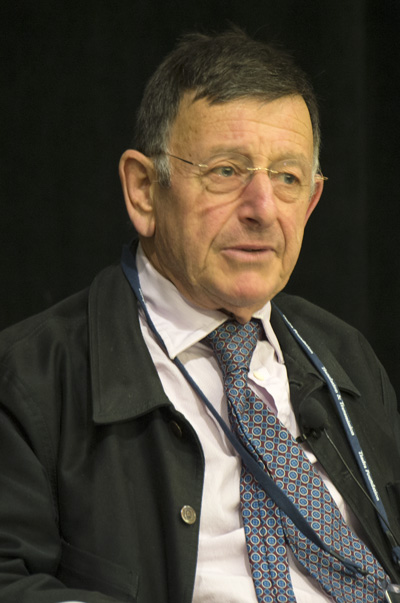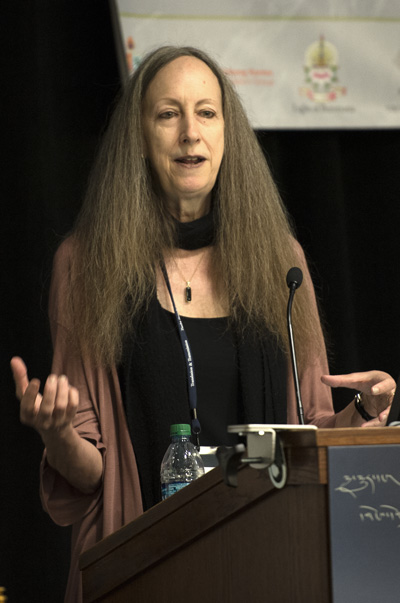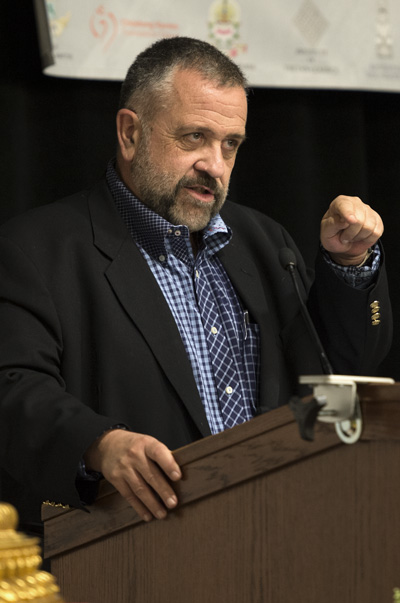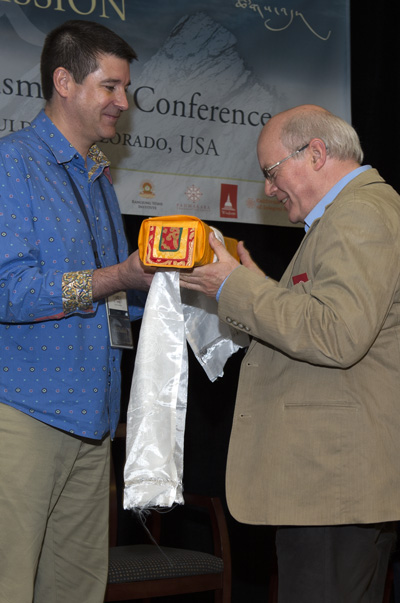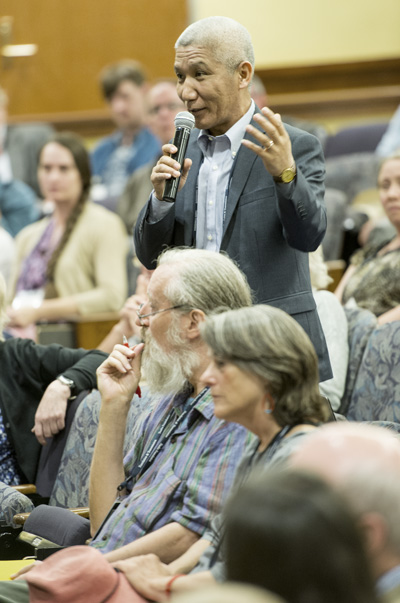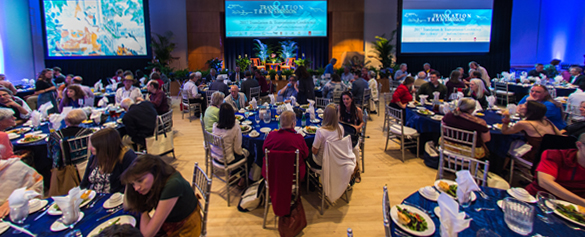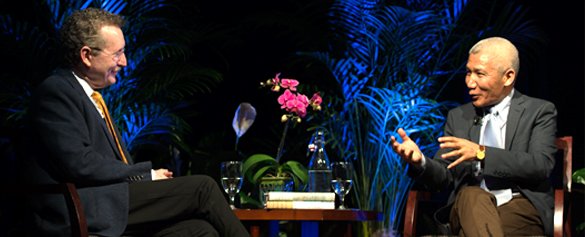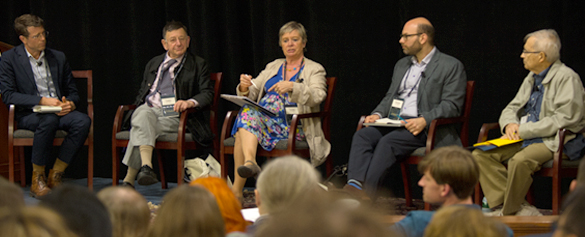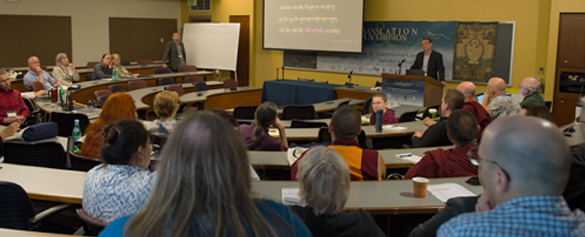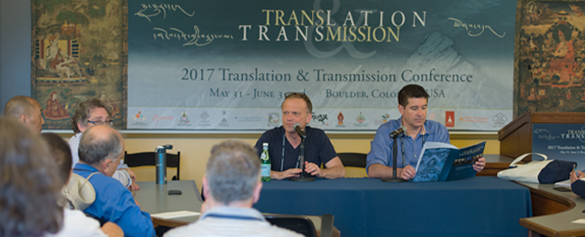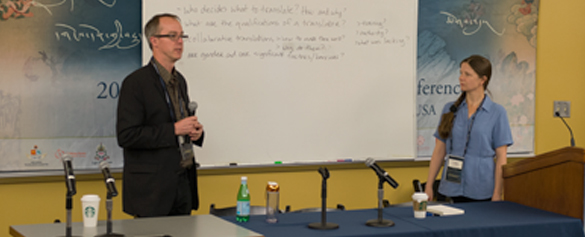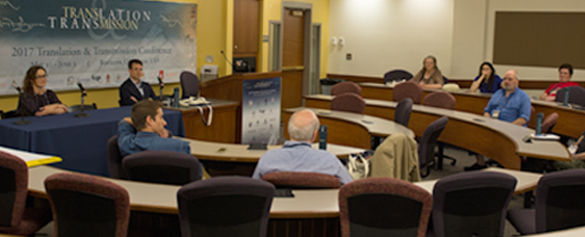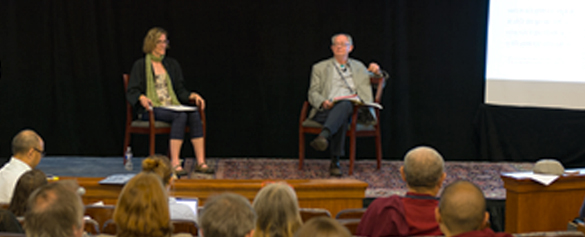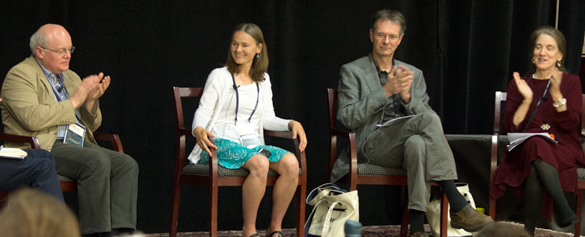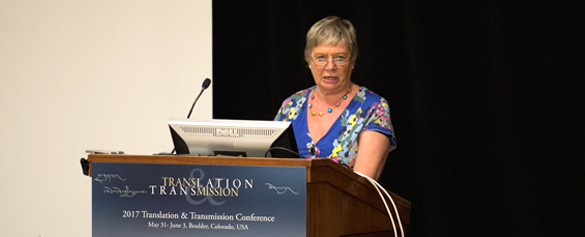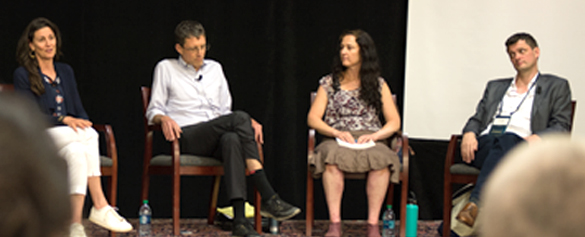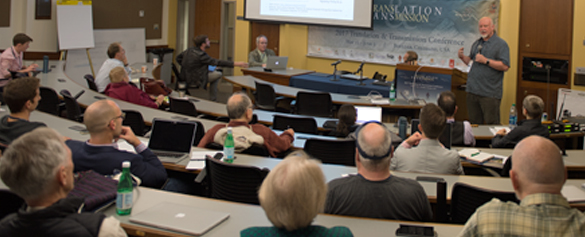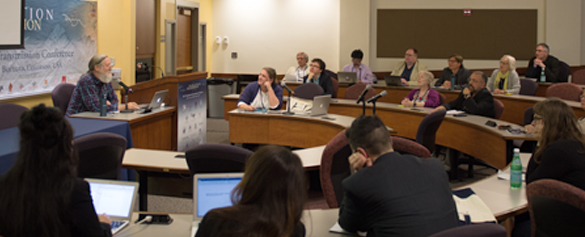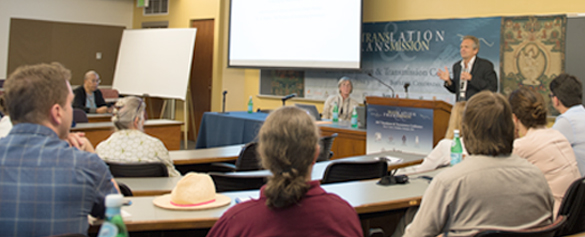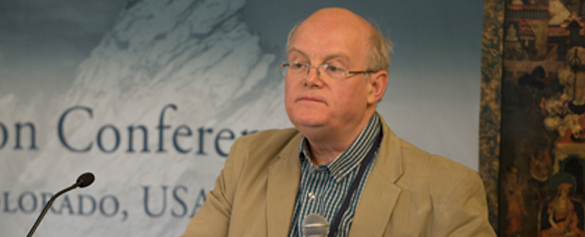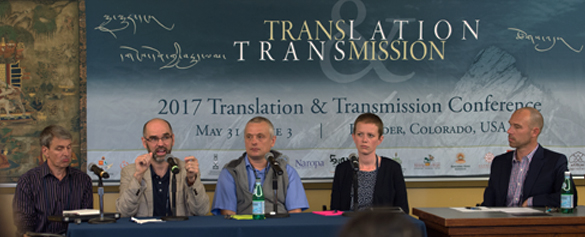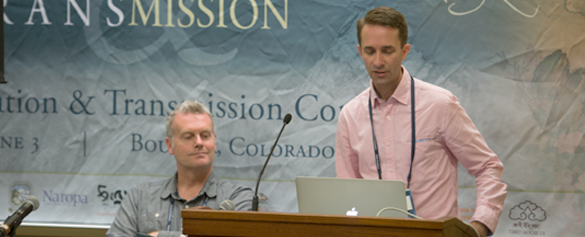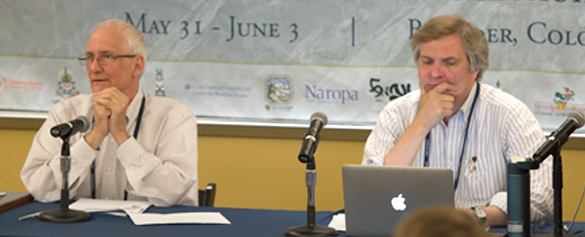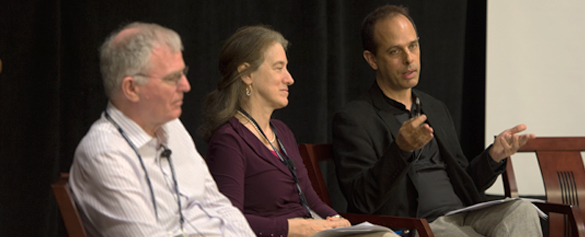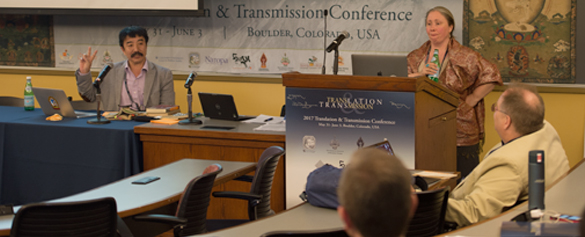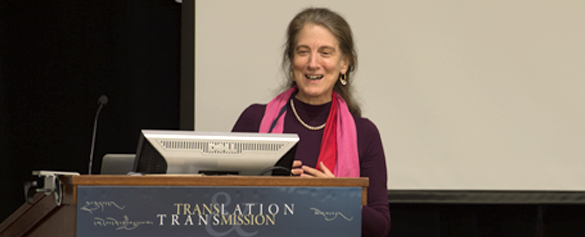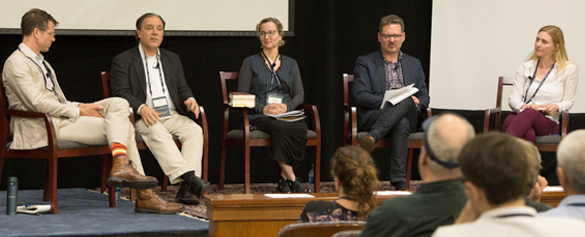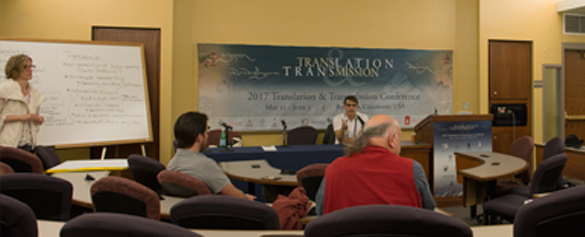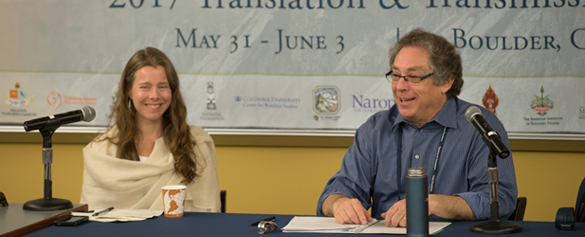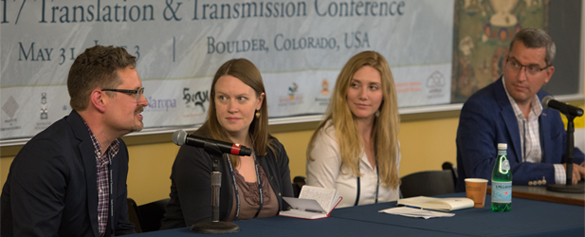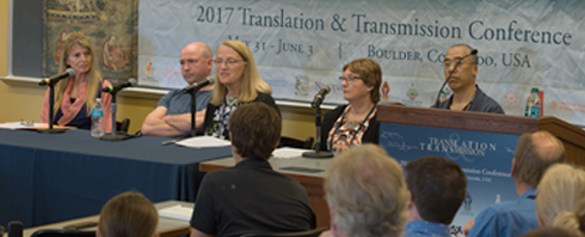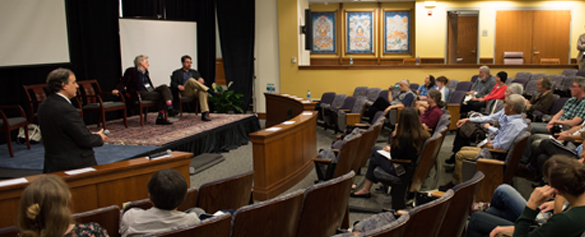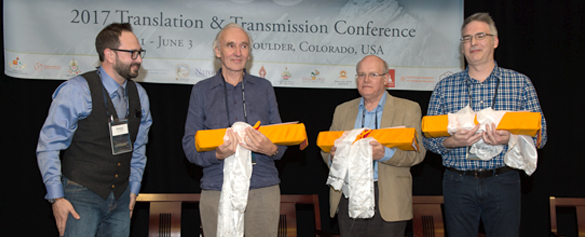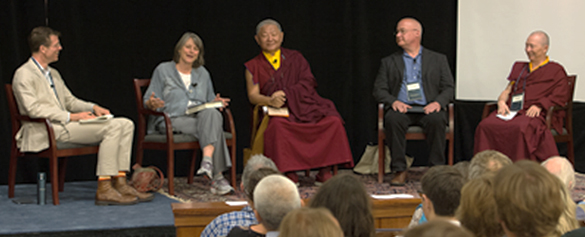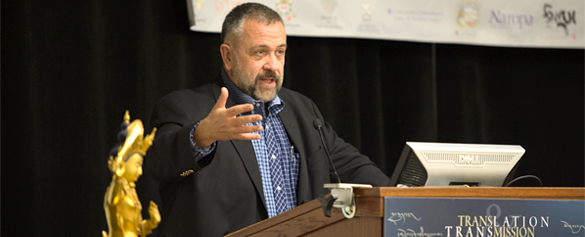New Update: Audio recordings only available here
Building upon the felicitous connections from the first conference and responding to requests for a lower altitude venue, the University of Colorado, Boulder hosted the second Translation & Transmission conference in the American Buddhist enclave of Boulder. More than 250 translators, scholars, and practitioners gathered representing over forty-five translation groups and sanghas and thirty-five universities around the world. As with the first conference, the context of our work as translators and transmitters was expanded and deepened by making the effort to invite speakers from outside of the Tibetan Buddhist world and discussions on editing and publishing translations and technology for translators expanded the opportunities to learn more skills at these conferences. The theme of translation with kindness from the first conference developed into love–love of language, love of culture, love of people–which became a recurring theme after it was first mentioned in the opening banquet by Thupten Jinpa, and was expanded upon by Yeshe Gyamtso on his panel discussion “Translations in Transmission.” The opening banquet was a very special event where the remarkable translation duo of Donald Lopez and Thupten Jinpa reflected on their collaborations and a lifetime of scholarship with the gathered community.
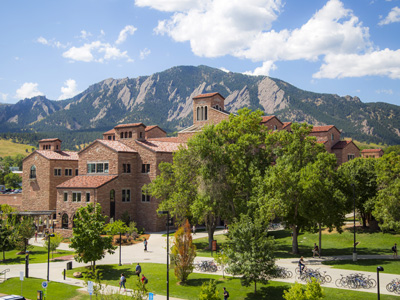
The first day of the conference included a talk by the impeccable Susan Bassnett, a specialist in translation theory and its history, who kindly traveled from England to broaden our understandings of translation and enjoy the exchange of ideas with translators from the Himalayan world. Everyone will remember the passion and openness of Heidi Nevin sharing her experience of translation, and her unique reminder of the importance of funding support. The first day also saw the final public appearance of professor Luis Óscar Gómez, who sadly passed away not long after the conference. You can view his final speech here along with an obituary by Donald Lopez, Jr. MEMORIAL FOR LUIS ÓSCAR GÓMEZ The second full day of the conference saw one of the most remarkable speeches from the influential Jan Nattier, The Proto-History of Buddhist Translation, which opened many minds to the complexity of early Buddhist translation history and practices. On the final day, the inimitable José Ignacio Cabezón gave the final keynote lecture of the meeting tracing the process of translation across cultures and centuries, and the first Shantarakshita Award for Excellence in Translation was awarded, which marks the beginning of a tradition to honor the efforts and abilities of our growing community of published translators. The heart of the gathering emerged as participants’ reactions to the keynote lectures and the respectful panel presentations were voiced during afternoon workshops and discussions each day. The opportunity for open exchange during these sessions allowed ongoing conversations to emerge about transmission as it relates to Buddhist education, the skillful use of modern resources for translation and transmission, the editorial process, and perhaps most importantly, priorities for our combined work in the coming decades. Thanks and appreciation to Alexander Gardner for his unflagging work to introduce and host each plenary session throughout the conference.

The Conference Steering Committee
The Steering Committee meets regularly in the years leading up to each conference, designing meetings that will be inclusive of all traditions and approaches to the translation and transmission of Tibetan Buddhism to the West. Comprised of international representatives from some of the most well-established translation groups and university programs, these master translators have more than 300 years of combined experience translating the Tibetan language. The committee itself represents the community building effort at the heart of the conference series.
José Cabezón (University of California, Santa Barbara) John Canti (Padmakara Translation Group & 84000) Wulstan Fletcher (Padmakara Translation Group & Tsadra Foundation) Holly Gayley (University of Colorado, Boulder) Sarah Harding (Naropa University & Tsadra Foundation) Thupten Jinpa (Institute of Tibetan Classics) Anne Klein (Rice University & Dawn Mountain) Marcus Perman (Tsadra Foundation) Andrew Quintman (Yale University) Kurtis Schaeffer (University of Virginia) Tom Yarnall (Columbia University & AIBS)

The 2017 Conference Revisited
Wednesday, May 31, 2017
WELCOME DAY
6:00 PM Welcome Speeches from Eric Colombel, Chuck Lief, and Velario Ferme
7:00 PM Evening Event with Donald Lopez Jr. and Thupten Jinpa, introduced by Alexander Gardner
Thursday, June 1, 2017
DAY ONE - TRANSLATORS
9:00 AM Keynote Lecture: What Authority Can a Translation Claim?
11:00 AM Plenary Session 1: Translators and Intention
2:30 PM Discussion Sessions
- Translation Theories Made Practical
- Working Together: Approaches to Collaboration and Negotiation
- Who Gets to be a Translator? Qualifications and the Question of Authority
- The Translator’s Intention: Motivation, Intended Impact, and Why They Matter
- Translation: Fidelity vs Innovation
4:45 PM Plenary Session 2: Approaches to Translation and Transmission
Friday, June 2, 2017
DAY TWO - TRANSLATING
9:00 AM Keynote Lecture: The Proto-History of Buddhist Translation: From Gāndhārī and Pāli to Han-Dynasty Chinese
11:00 AM Plenary Session 3: Translating: What and How?
2:30 PM Translator’s Craft Sessions 1:
- Kavya in Tibet
- Translating the Languages of Contemplative Experience: rdzogs chen dang phyag rgya chen po
- Unique Registers and Specialized Terminology: Sanskrit and the Tibetan Language in Translation
- Working with Old Tibetan Sources
- Approaches to Transmission in the West: A Discussion with Contemporary Shedra Students
4:45 PM Translator’s Craft Sessions 2:
- Working with the Medium of the English Language
- Accuracy and Inspiration: Translating Mahamudra Texts
- Oddities and Curiosities in Tibetan Translation
- Using Technology Skillfully: Resources for Translators
- Approaches to Transmission in the West: New Voices and Old Traditions
Saturday, June 3, 2017
DAY THREE - TRANSLATION
9:00 AM Keynote Lecture: Translation for the Sake of Self and Other
11:00 AM Plenary Session 4: Translations in Transmission
1:00 PM Special Address: Shantarakshita Award
2:30 PM Discussion Sessions
- Large Scale Projects: Multi-volume, Multi-source-language, and Collaborative Projects
- Translations and Teaching Tibetan Buddhism in the Modern World
- Publishing Translations: A Q&A with Two Buddhist Publishers
- Editing for Practitioners: Presenting Liturgies, Commentaries, and Songs of Realization
- Transmission and Translation: Priorities for the Next 20 Years
4:45 PM Plenary Session 5: The Editorial Process Throughout Creation and Completions Stages
6:30 PM Concluding Session with Anne Klein
Speakers and Facilitators
Search speakers details
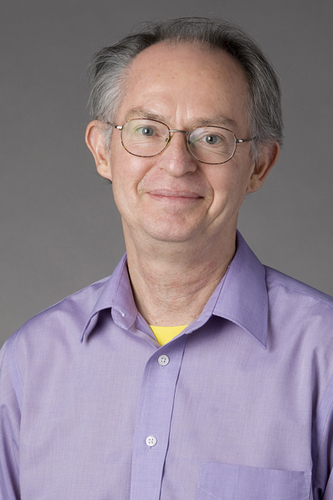
Roger Jackson
Carleton College, Emeritus
Roger Jackson is John W. Nason Professor of Asian Studies and Religion, Emeritus, at Carleton College. He also has taught at the University of Michigan, Fairfield University, McGill University, and Maitripa College. He has a BA from Wesleyan University and an MA and PhD from the University of Wisconsin, where he studied under Geshe Lhundub Sopa. His books include Is Enlightenment Possible? (1993), Tibetan Literature (with José Cabezón, 1996), Buddhist Theology (with John Makransky, 1999), Tantric Treasures (2004), The Crystal Mirror of Philosophical Systems (with Geshe Sopa et al., 2009), and Mahāmudrā and the Bka’ brgyud Tradition (with Matthew Kapstein, 2011). He is a past editor of the Journal of the International Association of Buddhist Studies, and currently co-edits the Indian International Journal of Buddhist Studies. He is in the final stages of preparing a major study and anthology centered on Mahāmudrā theory and practice in the Geluk tradition.
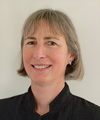
Elizabeth Callahan
Tsadra Foundation Fellow
Elizabeth has been engaged in contemplative training and Tibetan Buddhist studies for more than 35 years. A Tsadra Fellow since 2002, she has engaged in both written translation and oral interpretation including working closely with Khenpo Tsültrim Gyamtso, as well as completing two three-year retreats at Kagyu Thubten Chöling, New York. Elizabeth specializes in translating texts related to mahāmudrā and esoteric tantric commentaries and has published the Ninth Karmapa’s Mahāmudrā: Ocean of Definitive Meaning, Jamgön Kongtrul’s The Treasury of Knowledge Book 6, Part 3, and the third Karmapa Rangjung Dorje’s Profound Inner Principles (with Kongtrul’s commentary). She is currently working on Dakpo Tashi Namgyal’s Moonbeams of Mahāmudrā (Phyag chen zla ba’i ‘od zer) and the Ninth Karmapa’s Dispelling the Darkness of Ignorance (Ma rig mun sel). Elizabeth is also the Director of Advanced Study Scholarships at Tsadra Foundation and is the executive director of Marpa Foundation.
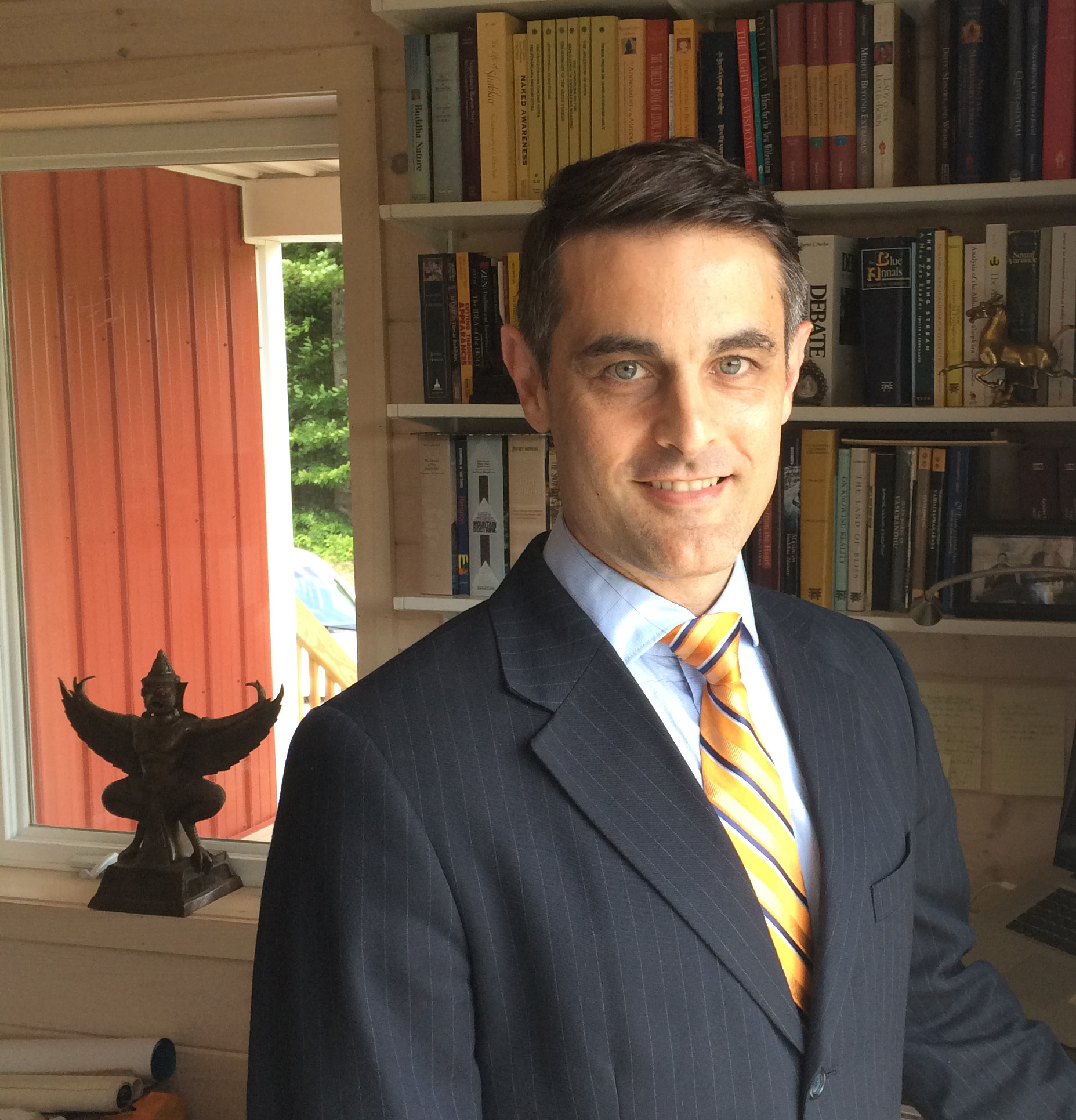
Greg Seton
Dartmouth College
Dr. Greg Seton is presently a lecturer teaching Tibetan Buddhism in the religion department at Dartmouth College and a translator for the 84000 Project. He received an MA in Indo-Tibetan Buddhist studies with Tibetan language from Naropa University in 2004 and a masters degree in Religious Studies with Sanskrit and Tibetan from University of California Santa Barbara in 2008. After holding a DAAD research fellowship at the University of Hamburg, where he did several years of research under the guidance of Harunaga Isaacson, he received a DPhil in Sanskrit and Tibetan Buddhist Studies from the University of Oxford, under Alexis Sanderson and Vesna Wallace, in 2015. Before taking his present job, he worked as professor of Buddhist studies at Mahidol University in Thailand from 2015-2016. Among Dr. Seton’s forthcoming works are his translation of “The Perfection of Wisdom Scripture in 8000 Verse Lengths”; his book “Defining Wisdom” a study of Ratnākaraśānti’s commentaries on the Perfection of Wisdom; and his Sanskrit and Tibetan critical editions of Ratnākaraśānti’s Sāratamā, based on 11th and 13th century palm leaf Sanskrit manuscripts and 15th century Tibetan block prints. These are due to be published in 2018.
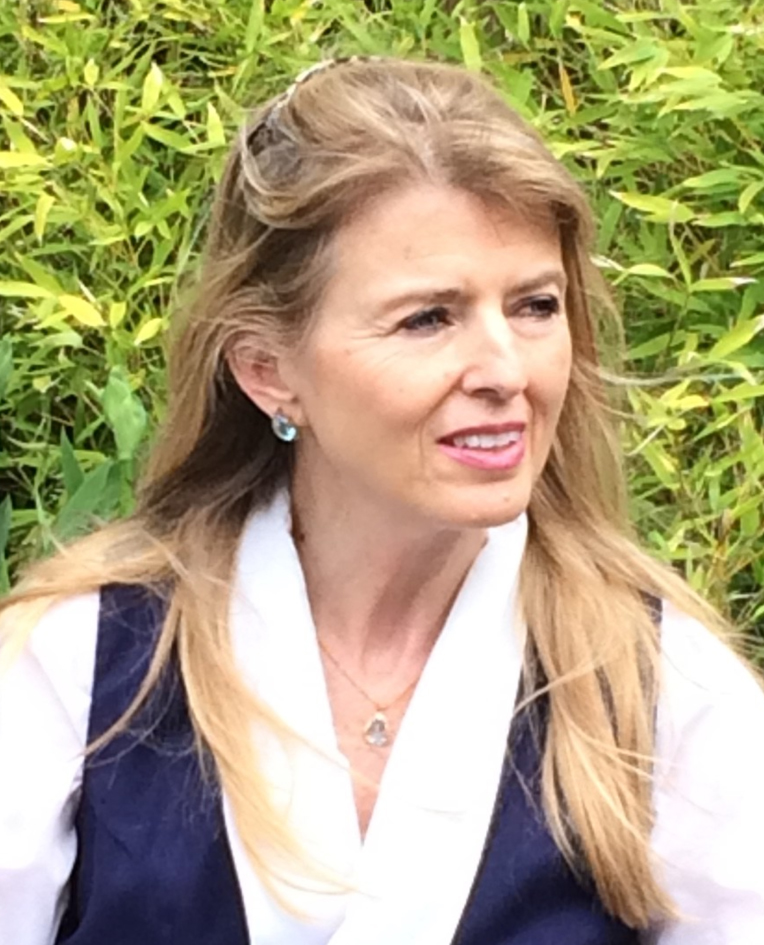
Sangye Khandro
Light of Berotsana
Sangye Khandro has been a Buddhist since 1971 and a translator of the Dharma since 1976. She has helped to establish numerous centers in the US and founded Light of Berotsana Translation Group in 1999. Sangye has served as translator for many prominent masters over the years: Düdjom Rinpoche, Penor Rinpoche, Jigme Phuntsok Rinpoche, Dungsei Thinley Norbu Rinpoche, Yangthang Tulku Rinpoche, and has been Khenchen Namdrol Rinpoche’s translator for twenty years. She has translated a number of important books including Precious Treasury of the Genuine Meaning, Dudjom Lingpa’s Chod, the Guhyagarbha Tantra Series, Yeshe Lama, Sole Essence of Clear Light, The Lives and Liberation of Princess Mandarava, Troma Nagmo Chod Liturgy series, Chetsun Nyingthig Liturgy series and many commentaries on the subject of the Great Perfection. Sangye lives at Tashi Choling retreat center in Ashland Oregon where together with Lama Chonam she continues to engage in translation work as well as teaching and leading retreats in the US and abroad.
Christian Wedemeyer
University of Chicago
Christian K. Wedemeyer is associate professor of the history of religions at the University of Chicago Divinity School. He is the author of Making Sense of Tantric Buddhism: History, Semiology, and Transgression in the Indian Traditions (Columbia University Press; winner of the 2013 American Academy of Religion Award for Excellence in the Study of Religion) and Āryadeva’s Lamp That Integrates the Practices (Caryāmelāpakapradīpa): The Gradual Path of Vajrayāna Buddhism According to the Esoteric Community Noble Tradition (AIBS, 2007). He is currently completing another volume of translations: Tantric Practices of the Esoteric Community: Ritual and Exegetical Works of the Noble Tradition.
Larry Mermelstein
Nālandā Translation Committee
Beginning in 1971, Larry Mermelstein became a close student of the Venerable Chögyam Trungpa Rinpoche, Tibetan Buddhist meditation master and scholar, and he is empowered as a senior teacher, or acharya, by Sakyong Mipham Rinpoche. He has been the Executive Director of the Nalanda Translation Committee since 1978, the same year he became an editor at Shambhala Publications, where he continues to serve as a consulting editor. He was among the founding administrators and later a language teacher (Sanskrit and Tibetan) at Naropa University, and he was a member of the Vajradhatu/Shambhala International board of directors for many years.
John Canti
Padmakara Translation Group; 84000
In 1970, while studying medicine at Cambridge, John Canti first met his Buddhist teachers, and started to practice under their guidance. After hospital work in London and Cambridge, he moved in the late seventies to eastern Nepal to establish tuberculosis programs in two remote hill districts. Beginning in 1980, he underwent two three-year retreats in the Dordogne, France. Emerging from retreat at the end of the 80s, he helped found the Padmakara Translation Group, of which he is now president, and remains an active translator. From 2001 to 2014 he was a Fellow of the Tsadra Foundation. He is editorial director of 84000 and serves on the working committee as chair of the editorial section. He is based mainly in France but has spent long periods in Nepal and India. As well as his 84000 work, John is working on Mipham’s commentary on the Ratnagotravibhāgottaratantraśāstra.
Dan Hirshberg
University of Mary Washington; Nitartha Translation Network
Dan Hirshberg is assistant professor of religion at the University of Mary Washington in Fredericksburg, VA, where he directs the Contemplative Studies program. He received his PhD in Tibetan Buddhism and Historiography from Harvard University, and recently published the revision of his dissertation as Remembering the Lotus-Born: Padmasambhava in the History of Tibet’s Golden Age (Wisdom Publications, 2016). Dan is an active member of the Nitartha Translation Network, and continues to work on the evolution of the Padmasambhava Bka’ thang literature and its core topoi, such as the renowned “eight names of the guru.”
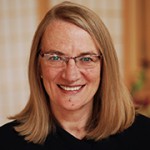
Judith Simmer-Brown
Naropa University
Judith Simmer-Brown, PhD, is Distinguished Professor of Contemplative and Religious Studies at Naropa University in Boulder, Colorado. She is an Acharya (senior dharma teacher) of the Shambhala Buddhist lineage of Sakyong Mipham, Rinpoche and Chogyam Trungpa, Rinpoche, Naropa’s founder. She lectures and writes on Tibetan Buddhism, American Buddhism, women and Buddhism, interreligious dialogue, and contemplative education. Her books are Dakini’s Warm Breath: The Feminine Principle in Tibetan Buddhism (Shambhala) and, with Fran Grace, an edited collection of articles called Meditation and the Classroom: Contemplative Pedagogy for Religious Studies (Religious Studies Series, State University of New York Press, 2010).
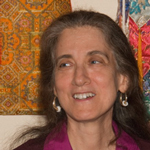
Anne Klein
Rice University
Anne Carolyn Klein/Rigzin Drolma, Professor and Former Chair of Religious Studies, Rice University, and Founding Director of Dawn Mountain, (www.dawnmountain.org). Her six books include Heart Essence of the Vast Expanse: A Story of Transmission; Meeting the Great Bliss Queen, Knowledge & Liberation, and Paths to the Middle as well as Unbounded Wholeness with Geshe Tenzin Wangyal Rinpoche. She has also been a consulting scholar in several Mind and Life programs. Her central thematic interest is the interaction between head and heart as illustrated across a spectrum of Buddhist descriptions of the many varieties of human consciousness.
Andreas Doctor
Dharmachakra Translation Committee
Andreas Doctor (PhD, University of Calgary) is director of Dharmachakra Translation Committee, Kathmandu, Nepal. He also serves on the editorial committee of 84000: Translating the Words of the Buddha. He is currently working with the Dharmachakra Translation Committee on translations of several sūtras and tantras from the Tibetan canon as part of the 84000 project to translate the Tibetan Kangyur into English.
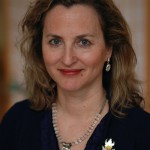
Emily Bower
Shambhala International
Emily Bower works as a book editor specializing in Buddhism, psychology, and yoga. She is the project manager and editor for an 84000 translation team that has completed three projects. She worked at Shambhala Publications for a total of eleven years, ten years as an acquiring editor. She has worked on a freelance basis for Wisdom Publications as well. She is a staff reviewer and curator at Dharma Spring, the online Buddhist bookstore. She also serves as a senior teacher in the Shambhala International community, leading retreats and weekend workshops for the past twelve years in the U.S. and Canada, and more recently in Australia and New Zealand. She has a bachelor’s degree in Religious Studies from Brown University and studied writing and editing in UC Berkeley’s annex programs. She is married to the translator and novelist Peter Alan Roberts.

Nicole Willock
Old Dominion University
Nicole Willock (PhD Indiana University in Tibetan Studies and Religious Studies, 2011) is an assistant professor at Old Dominion University in Norfolk, Va. She is 2017 Research Fellow, The Robert H. N. Ho Family Foundation Program in Buddhist Studies, administered by the American Council of Learned Societies for her book project: Lineages of the Literary: Tibetan Buddhists Making Modern China. She is currently polishing up A Tibetan-English Primer for Poetics (Snyan ngag leg deb bod yin shan sbyar), which is co-authored by Gendün Rabsal. She also co-translated “Zhangtön Tenpa Gyatso’s Advice a Jeweled Rosary” with Gendün Rabsal, which will appear in A Gathering of Brilliant Moons: Practice Advice from the Rimé Masters of Tibet, edited by Holly Gayley and Joshua Schapiro (Boston: Wisdom Publications, expected in 2017).

Paul Hackett
Columbia University
Paul G. Hackett holds a PhD and MPhil from Columbia University, a MLS from the University of Maryland at College Park, a MA from the University of Virginia, and a BS from the University of Arizona. He specializes in canonical Buddhist philosophy and Tibetan culture, as well as their influence on alternative religion in America. He is also active in the field of Digital Humanities, is the director of the Buddhist Canons Research Database, and serves as co-chair of the Tibetan Information Technology and Digital Humanities Panel of the International Association for Tibetan Studies. He is the author of “A Tibetan Verb Lexicon,” “A Catalogue of the Comparative Kangyur,” and others, and is one of the primary translators of the Guhyasamāja Tantra (with Candrakīrti’s commentary, the Pradīpoddyotana) under a grant from the National Endowment for the Humanities.

Amelia Hall
Naropa University
Amelia Hall became a student of Thinley Norbu Rinpoche and Lama Tharchin Rinpoche in 2001. In 2005 she embarked upon a master’s degree in Tibetan and Himalayan Studies from the University of Oxford. She obtained her doctorate from Oxford in 2012, her dissertation, Revelations of a Modern Mystic: The Life and Legacy of Kun bzang bde chen gling pa 1928-2006, translates and reflects upon the biography of this Tibetan Buddhist visionary and the assimilation of Tibetan Buddhism in contemporary North America. She currently teaches courses on Buddhism and Tibetan language at Naropa University. In addition she directs research projects for the Naksang Foundation. Current projects focus on the translation and study of biographies, historical texts, and maps relating to the spread of Buddhism in the 17th Century CE from Tibet and Bhutan to Arunachal Pradesh. She is also an affiliated scholar at the Tibetan and Himalayan Studies Centre at Wolfson College, University of Oxford.
Kurtis Schaeffer
University of Virginia
Kurtis R. Schaeffer received an MA in Buddhist Studies from the University of Washington in 1995, a PhD in Tibetan and South Asian Religions from Harvard in 2000 and is now an associate professor of Tibetan and Buddhist Studies at the University of Virginia. His books include Sources of Tibetan Tradition (2013), The Tibetan History Reader (2013), The Culture of the Book in Tibet (2009), An Early Tibetan Catalogue of Buddhist Literature (2009), Dreaming the Great Brahmin (2005), and Himalayan Hermitess (2004).
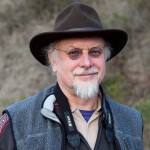
Kurt Keutzer
Berkeley
Kurt Keutzer is Professor of Electrical Engineering and Computer Science at University of California, Berkeley. Kurt received his PhD in Computer Science from Indiana University in 1984, and gained a doctoral minor in Tibetan Studies in the process. In the ensuing thirty years he has continued his studies with many Western and Tibetan scholars from all five of Tibet’s principal traditions, and produced many privately circulated translations. In 2013 he published his first serious research paper in Tibetan studies: “The Nine Cycles of the Hidden, The Nine Mirrors, and Nine Minor Texts on Mind: Early Mind. Section Literature in Bon”, in Revue d’Etudes Tibétaines. Kurt is currently working to develop a robust optical character recognition software for Tibetan script, and is generally quite delighted to have the opportunity to unite and engage his diverse research interests in service of the preservation of Tibetan literature.
Karma Lekshe Tsomo
University of California, San Diego
Karma Lekshe Tsomo is a professor of Theology and Religious Studies at the University of San Diego. She received novice precepts from the Sixteenth Gyalwang Karmapa in France in 1977 and full ordination in Korea in 1982. She studied Buddhism in Dharamsala for fifteen years and received a doctorate in Comparative Asian Philosophy from the University of Hawai`i in 2000. She is a founder and past president of Sakyadhita International Association of Buddhist Women (www.sakyadhita.org) and director of Jamyang Foundation (www.jamyang.org), an innovative education project for women in developing countries. She has edited a number of books on women in Buddhism.
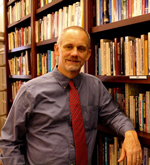
Valerio Ferme
University of Colorado, Boulder
Valerio Ferme is currently Associate Professor of Italian, Chair of Dept. of French and Italian and voting member in the Program in Comparative Literature at the University of Colorado, Boulder. He received his Ph.D. in Comparative Literature from the University of California at Berkeley and has taught at the University of Colorado since 1998.
Sarah Harding
Tsadra Foundation Fellow; Naropa University
Sarah Harding has been a Buddhist practitioner since 1974 and has been teaching and translating since completing a three-year retreat in 1980 under the guidance of Kyabje Kalu Rinpoche. Her publications include Creation and Completion, The Life and Revelations of Pema Lingpa, Treasury of Knowledge: Esoteric Instructions, Machig’s Complete Explanation, and Niguma, Lady of Illusion. She is an associate professor at Naropa University in Boulder, Colorado, where she has been teaching since 1992, and has been a fellow of the Tsadra Foundation since 2000. Currently she is working on translating the zhi byed and gcod sections of the gdams ngag rin po che’i mdzod.
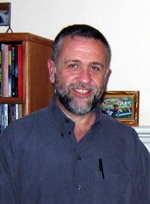
José Cabezón
University of California, Santa Barbara
José Ignacio Cabezón is XIVth Dalai Lama Professor of Tibetan Buddhism and Cultural Studies, and former chair of the Religious Studies Department at UC Santa Barbara. He has published a dozen books and numerous articles related to Tibetan and Buddhist Studies including several translations. His most recent books include The Buddhist Doctrine and the Nine Vehicles (Oxford, 2012), Tibetan Ritual (Oxford, 2010), and Meditation on the Nature of Mind, with His Holiness the Dalai Lama (Wisdom, 2009). He is currently completing a monograph that is a doctrinal study of Buddhism and sexuality in classical India and Tibet and will have a new book from Shambhala Publications coming out in June 2017, The Just King: The Tibetan Buddhist Classic on Leading an Ethical Life.
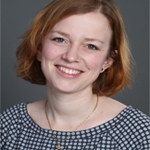
Katrin Querl
Drikung Kagyu
Katrin Querl holds a Master’s degree in Tibetology, Indology, and Religious Studies from the Ludwig-Maximilians-University in Munich, Germany. From 2011 to 2017 she studied Buddhist philosophy at the Kagyu College in Dehradun, India where she completed the first six years of the traditional monastic curriculum. Katrin is currently a PhD candidate at the Institute for South Asian, Tibetan and Buddhist Studies (ISTB) at the University of Vienna, writing her thesis on Tibetan presentations of the Three Wheels of Dharma (chos ‘khor rim pa gsum). She also collaborates with several translation projects such as the Vikramashila Translation Project, the Rinchenpal Translation Project, and the Buddhist Translation Studies project (BTS) at the University of Vienna.
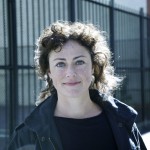
Dominique Townsend
Bard College, NY
Dominique Townsend is Assistant Professor of Buddhist Studies at Bard College. She received her BA from Barnard College, MTS from Harvard Divinity School and PhD from Columbia University in the Department of East Asian Languages and Cultures. Her research is stimulated by productive tensions in Buddhist cultures, such as the relationship between the cultivation of the arts and renunciation. Dominique’s primary interests include Buddhist poetics, pedagogy, and institutionalized charisma. Her current project, based on her dissertation research, focuses on aesthetics and cosmopolitanism in Tibetan Buddhism, with a particular focus on the history of Mindrölling Monastery.
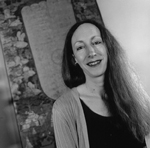
Jan Nattier
Hua Hin, Thailand
Jan Nattier did her undergraduate work in comparative religion (specializing in Buddhism) at Indiana University, where she also began graduate training in the Department of Uralic and Altaic Studies. She completed her PhD at Harvard University under the Committee on Inner Asian and Altaic Studies (specializing in classical Mongolian and Tibetan). She has taught at Macalester College, the University of Hawai’i, Stanford University, Indiana University, and the University of Tokyo, in addition to serving as a member of the International Research Institute for Advanced Buddhology (Soka University). Her monographs include Once Upon a Future Time: Studies in a Buddhist Philosophy of Decline (Asian Humanities Press, 1991), A Few Good Men: The Bodhisattva Path according to the Inquiry of Ugra (Ugraparipṛcchāsūtra) (University of Hawai’i Press, 2003), and A Guide to the Earliest Chinese Buddhist Translations (Soka University, 2008).
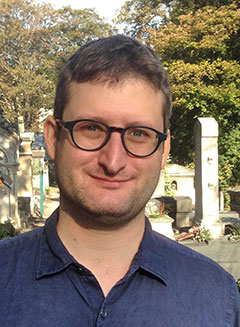
Nathan W. Hill
SOAS, London
Nathan W. Hill was educated at the Catlin Gabel School and Harvard University. At SOAS he teaches courses in historical linguistics and well as Tibetan language and history. Dr. Hill’s research focuses on Tibetan literature and Tibeto-Burman/Sino-Tibetan historical linguistics. In particular he has published on Old Tibetan descriptive linguistics, Tibetan corpus linguistics, Tibeto-Burman reconstruction and comparative linguistics, and the typology of evidential systems. He is currently one of three principal investigators on Beyond Boundaries: Religion, Region, Language and the State, a six-year international research collaboration jointly led by SOAS, the British Museum, and the British Library, funded by the European Research Council. He was co-investigator on Tibetan in Digital Communication: Corpus Linguistics and Lexicography (2012-2015).
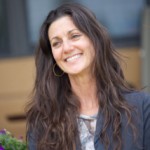
Elizabeth Mattis Namgyel
Samten Ling
Elizabeth Mattis-Namgyel has studied and practiced the Buddhadharma for 30 years under the guidance of her teacher and husband, Dzigar Kongtrul Rinpoche. She has been intimately involved with Rinpoche’s work in bringing Buddhist wisdom to the West. Having spent over six years in retreat, she now serves as the Retreat Master for Samten Ling, a long-term retreat center located in Southern Colorado. Elizabeth delights in wrestling with the challenges that tend to plague modern day practitioners, while maintaining a deep respect for the tradition she comes from. She teaches throughout the U.S. and Europe. She holds a degree in anthropology and an MA in Buddhist Studies and is the author of The Power of an Open Question and The Logic of Faith, which will be released in August, 2017.
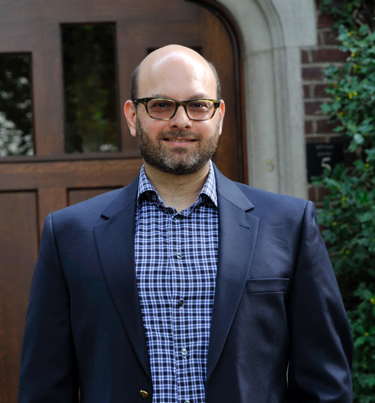
Jonathan Gold
Princeton University
Jonathan C. Gold teaches courses on the religions of India and Tibet at Princeton University, and his research focuses on Sanskrit and Tibetan Buddhist intellectual traditions–especially theories of interpretation, translation, and learning. His book, Paving the Great Way: Vasubandhu’s Unifying Buddhist Philosophy (2015), traces a continuity of philosophical interest and purpose across diverse works attributed to one of Buddhism’s greatest philosophers. His first book, The Dharma’s Gatekeepers: Sakya Pandita on Buddhist Scholarship in Tibet (2007), explains the nature of language and the role of the scholar from the unique perspective of a great thirteenth-century Tibetan philosopher. Current projects include studies in Buddhist ethics through the Tibetan “Three Vows” (sdom gsum) literature and Śāntideva’s Bodhicaryāvatāra, and a trans-national history of the doctrine of non-violence. He is founder of the Princeton University Buddhist Ethics Reading Group and co-chair of the Columbia University Seminar on Comparative Philosophy.

David Kittelstrom
Wisdom Publications
David Kittelstrom is a senior editor at Wisdom Publications, where he has worked since 1993, and staff editor for The Library of Tibetan Classics, Studies in Indian and Tibetan Buddhism, Teachings of the Buddha, and Classics of Indian Buddhism series. He is not himself a translator but has had the good fortune to work closely with many.
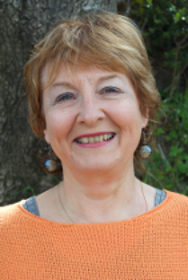
Dominique Side
Rigpa International
Dominique Side is a senior instructor in Rigpa International. She has been a student and practitioner of Tibetan Buddhism since 1975 following Sogyal Rinpoche, and was a founding trustee of Rigpa Fellowship in the UK. She was founding director of the Lerab Ling retreat centre in France from 1990-1994, and left to complete an MA in Indian Religions (SOAS) and a PhD in Madhyamaka (Bristol University, UK). She taught Buddhism in secondary schools in the UK (1996-2005). She edited The Four Noble Truths and Transforming the Mind by H.H. the Dalai Lama and is author of a school textbook on Buddhism. Under the guidance of Dzongsar Khyentse Rinpoche she is currently involved in developing a teacher training programme for Western Dharma teachers, and participates in discussions on how to adapt Dharma teaching to the West.
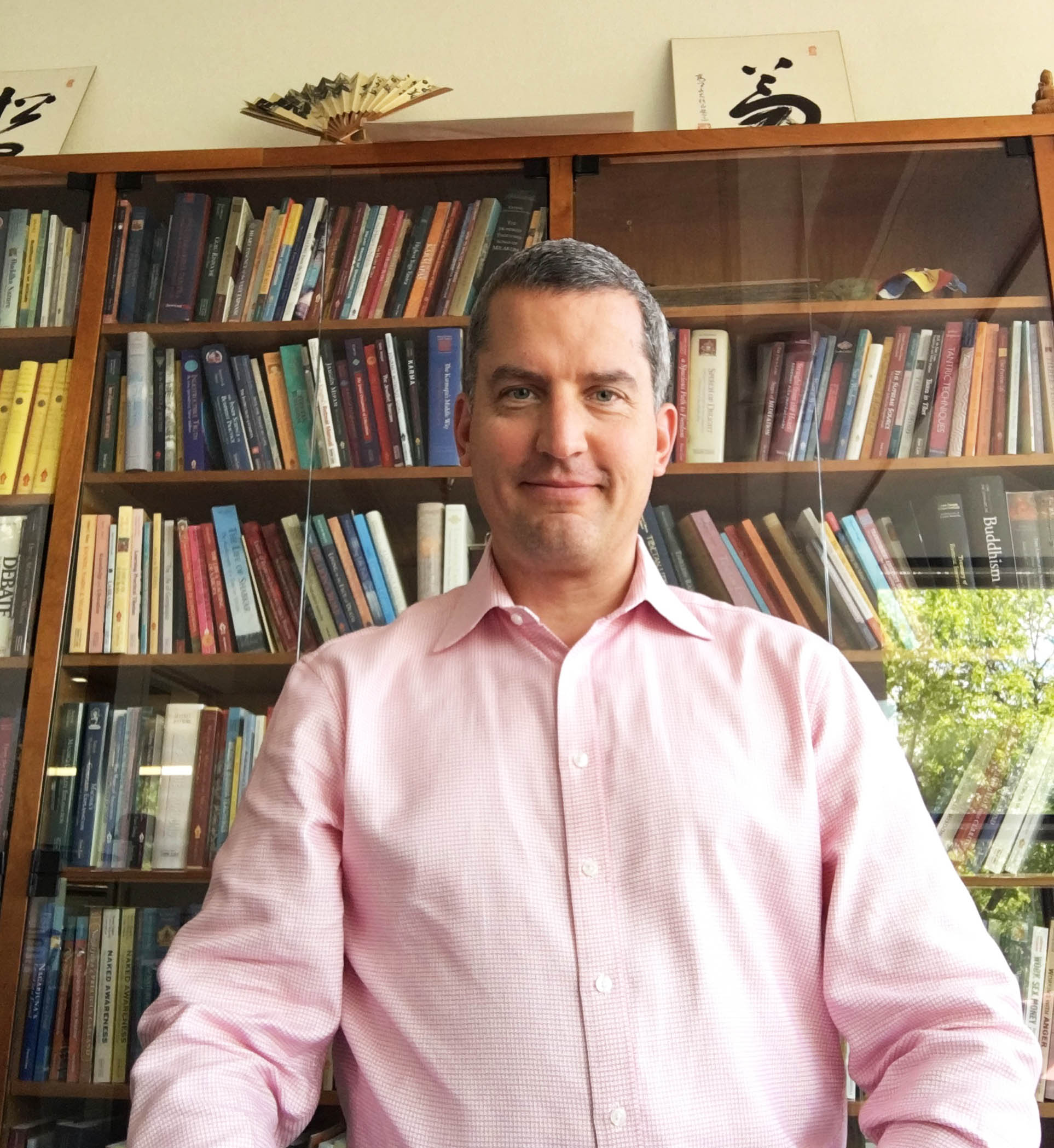
Nikko Odiseos
Shambhala Publications
Nikko’s first exposure to Tibetan language was as a student on the Antioch Buddhist Studies program in Bodhgaya in 1990 where he was also on staff for several years subsequently. He joined Shambhala Publications in 2010 as president. He is also on the boards of several Buddhist non-profits.
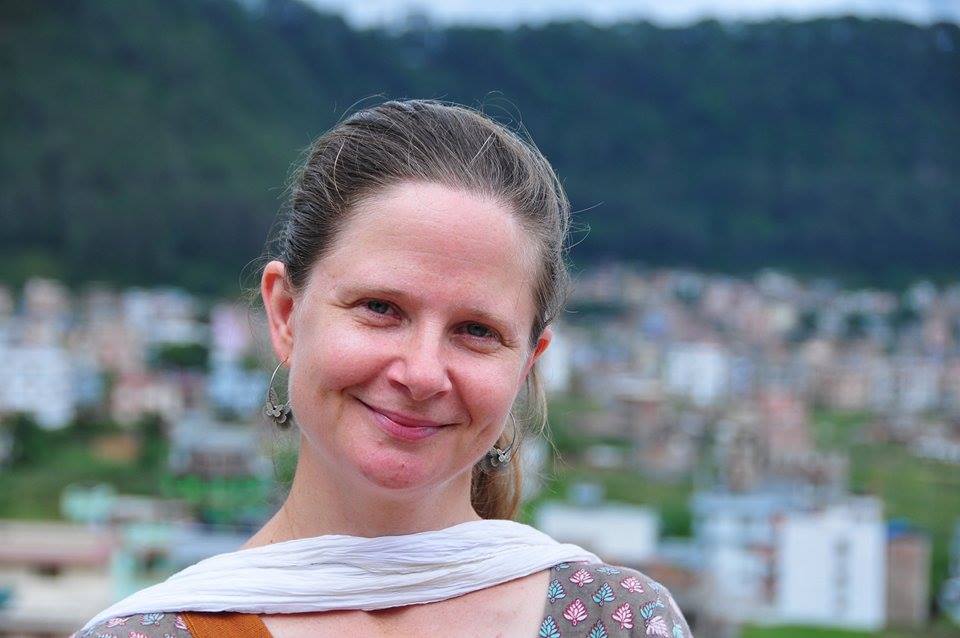
Lara Braistein
McGill University
Lara Braitstein is Associate Professor of Indian and Tibetan Buddhism at McGill University. She has also taught at the Karmapa International Buddhist Institute (K.I.B.I.) in New Delhi, and the Rangjung Yeshe Institute in Kathmandu. She teaches Mahayana & Vajrayana Buddhist Philosophy, Buddhist Hagiography, and Tibetan/Himalayan Buddhist literature and historiography. She translated the 14th Shamarpa’s The Path to Awakening, and is the author of The Adamantine Songs: Study, Translation, and Tibetan Critical Edition, a study of Saraha’s Mahamudra poems. Her recent research is a study dedicated to untangling the history and representation of the 10th Shamarpa Chodrup Gyatso.
Dan Martin
Independent
Dan Martin, PhD in Tibetan Studies, Indiana University, 1991. Researcher and translator with many interests in Tibetan religions, literature, and cultural topics. Currently working on a translation of a lengthy 13th-century history for the Library of Tibetan Classics series.
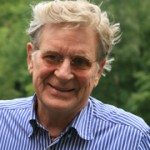
Robert Thurman
AIBS; Columbia University
Dr. Robert Thurman holds the Jey Tsong Khapa Chair in Indo-Tibetan Buddhist Studies at Columbia University. After education at Philips Exeter and Harvard, he studied Tibet and Tibetan Buddhism for fifty years as a personal student of H.H. the Dalai Lama and numerous other Mongolian and Tibetan teachers. He has written both scholarly and popular books, and has lectured all over the world. His special interest is in the history of Buddhism as a set of socially revolutionary, educational institutions, as well as in the Indo-Tibetan philosophical and psychological traditions, as alive in relevance to parallel currents of contemporary thought and science. He is also the president of Tibet House US, the president of the American Institute of Buddhist Studies, and the Editor-in-Chief of the “Treasury of the Buddhist Sciences.” His own published translations include the Vimalakīrti Sūtra, Tsong Khapa’s Essence of True Eloquence, and his Brilliant Illumination of the Lamp of the Five Stages.
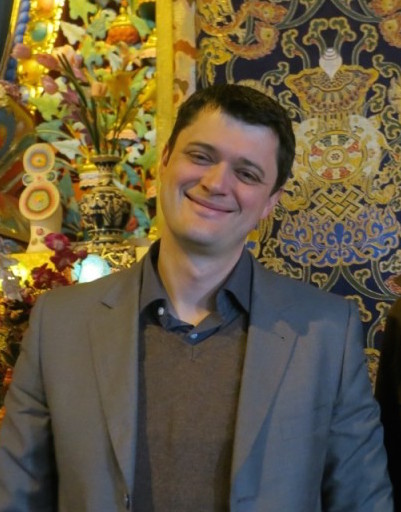
Gyurmé Avertin
Association Namthar
Guillaume Avertin (aka Gyurmé) is a member of Rigpa Translations and the Wu Tai Shan Clan and contributor to the Lotsawa House translations. Gyurmé began his study of the Tibetan language in 1997. He spent two years following the Tibetan program at Langues’O University in Paris, then studied at the Rangjung Yeshe Institute in Nepal and the Dzongsar Shedra in India. He regularly interprets for teachers visiting Rigpa centres and at the Rigpa Shedra East and works with Association Namthar.

Klaus-Dieter Mathes
University of Vienna
Prof. Dr. Klaus-Dieter Mathes is the Head of the Department of South Asian, Tibetan and Buddhist Studies at the University of Vienna. His current research deals with Tibetan Madhyamaka, Yogācāra and the interpretations of Buddha nature from the 14th to the 16th century. He obtained a Ph.D. from Marburg University with a study of the Yogācāra text Dharmadharmatāvibhāga (published in 1996 in the series Indica et Tibetica). His habilitation thesis was published by Wisdom Publications under the title A Direct Path to the Buddha Within: Gö Lotsawa´s Mahāmudrā Interpretation of the Ratnagotravibhāga (Boston: 2008). Recent publications include The Other Emptiness: Rethinking the Zhentong Buddhist Discourse in Tibet (SUNY, 2019) and A Fine Blend of Mahāmudrā and Madhyamaka. Maitrīpa’s Collection of Texts on Non-conceptual Realization (Amanasikāra) (Vienna, 2015). He is also a regular contributor to the Journal of the International Association of Buddhist Studies.

Anthony Chapman
Tsadra Foundation (Vice-President and Director of Contemplative Scholarships)
Anthony Chapman, (Lama Drupgyu Tenzin), a student of Kalu Rinpoche since 1972, and a monk from 1974 to 1995, participated in the first traditional three-year retreat for Westerners from 1976 to 1980, in France. Kalu Rinpoche subsequently appointed him as Lama of his center in Paris, and later Lama Drupgyu became the first westerner to be appointed Druppön, or Retreat Master, leading three-year retreats on Saltspring Island, Canada. Subsequently, he participated for six years in the translation of Jamgon Kongtrul’s Treasury of Knowledge. Anthony Chapman assisted in the establishment of Tsadra Foundation and was Director of Programs from 2000 to 2012. In 2010 he managed the transition of Tsadra Foundation’s Contemplative Program into the Advanced Contemplative Scholarships–supporting three-year retreatants around the world. He currently serves as Vice-President of the Foundation as well as Director of Contemplative Scholarships.
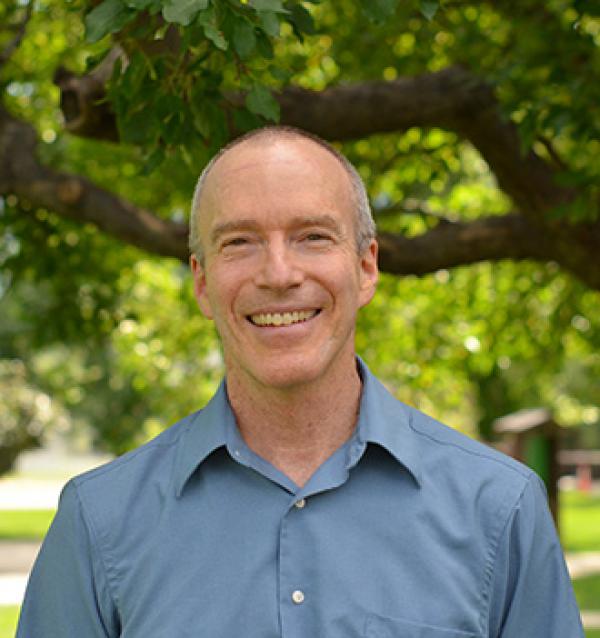
Gerry Wiener
Nitartha Translation Network, NTC
Gerry has been studying Tibetan since 1974, mostly in Boulder, Colorado. The Sambhota suite of fonts were designed by Gerry and he has worked on a number of digital projects including the Nitartha Digital Library. His main teachers are Trungpa Rinpoche, Ponlop Rinpoche, Khyentse Rinpoche, Dudjom Rinpoche, HH Karmapa, Khenpo Palden Sherab, Ringu Tulku, Thrangu Rinpoche, and Khenpo Gawang Rinpoche. He has translated The Excellent Path to Enlightenment and Essential Instructions on the Three Virtues of the Ground, Path, and Fruition of Resting in Mind Itself, the Great Completion by Longchenpa.
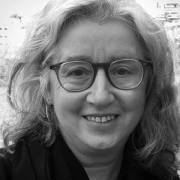
Janet Gyatso
Harvard University
Janet Gyatso (BA, MA, PhD, University of California at Berkeley) is a specialist in Buddhist studies with concentration on Tibetan and South Asian cultural and intellectual history. Her books include Apparitions of the Self: The Secret Autobiographies of a Tibetan Visionary; In the Mirror of Memory: Reflections on Mindfulness and Remembrance in Indian and Tibetan Buddhism; and Women of Tibet. She has recently completed a new book, Being Human in a Buddhist World: An Intellectual History of Medicine in Early Modern Tibet, which focuses upon alternative early modernities and the conjunctions and disjunctions between religious and scientific epistemologies in Tibetan medicine in the sixteenth–eighteenth centuries.
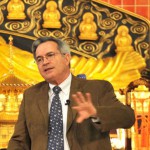
Luis Gómez
Profesor Investigador, El Colegio de México; Thurnau Emeritus Professor, University of Michigan; Academic Director, Mangalam Research Center
Luis O. Gómez, is Research Professor at El Colegio de México, México, DF., Academic Director at the Mangalam Research Centers for the Study of Buddhist Languages, Berkeley, CA, and Thurnau Professor Emeritus of Asian Languages and Cultures at the University of Michigan. He holds a PhD in East and South Asian Languages and Literatures from Yale University, and an MA and PhD in Clinical Psychology from the University of Michigan. He delivered the Stewart Lectures at Princeton, April 24-30, 1997, and the Clark and Horrowitz Lectures at Pomona College. He has been Numata Visiting Professor at the University of Hamburg (2013) and Shinnyo-en Visiting Professor at the Ho Foundation Center for Buddhist Studies at Stanford University (2013). Some of his books include The Land of Bliss, the Sukhāvatīvyūha Sūtras, and The Literature of the Great Vehicle.
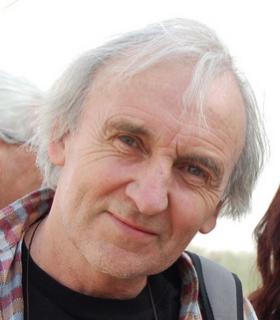
Gavin Kilty
Institute of Tibetan Classics; FPMT
Gavin Kilty has been a full-time translator for the Institute of Tibetan Classics since 2001. Before that he lived in Dharamsala, India, for fourteen years, where he spent eight years training in the traditional Geluk monastic curriculum through the medium of class and debate at the Institute of Buddhist Dialectics. He teaches Tibetan language courses in India and Nepal, and is a translation reviewer for the organization 84000, Translating the Words of the Buddha. Included among his published translations are Ornament of Stainless Light, Mirror of Beryl, Lamp Illuminating the Five Stages, and Splendor of an Autumn Moon.

Ari Goldfield
Wisdom Sun
Ari Goldfield is a Buddhist teacher, translator, and psychotherapist in private practice. Along with his wife Rose, Ari co-directs Wisdom Sun, the international Buddhist community founded in 2011. From 1996-2009, Ari served as translator, attendant, and general secretary to his own teacher, Khenpo Tsültrim Gyamtso Rinpoche. Ari is a published author on Buddhist philosophy and meditation, including chapters in The World’s Great Wisdom (SUNY Press) and Freeing the Body, Freeing the Mind (Shambhala Publications), and articles in Buddhadharma and Shambhala Sun magazines. His translations include the books: Sun of Wisdom, Moon of Wisdom, and Stars of Wisdom, and Khenpo Rinpoche’s Song of the Eight Flashing Lances teaching, which appeared in The Best Buddhist Writing 2007 (all Shambhala Publications). Before beginning his Buddhist training, Ari worked as a corporate attorney in Silicon Valley. Ari and Rose live in San Francisco with their three-year-old son, Oliver.
David Bellos
Princeton University
David Bellos is professor of French and Comparative Literature at Princeton, where he also directs the Program in Translation and Intercultural Communication. He has translated works by Georges Perec, Ismail Kadare, Fred Vargas and many others and is also the author of literary biographies of Georges Perec, Jacques Tati, and Romain Gary. His irreverent essay on translation, “Is That A Fish In Your Ear? Translation and the Meaning of Everything,” was published in 2011.
Douglas Duckworth
Temple University
Douglas Duckworth is Assistant Professor in the Department of Religion at Temple University. He is the author of Mipam on Buddha-Nature: The Ground of the Nyingma Tradition (SUNY, 2008) and Jamgön Mipam: His Life and Teachings (Shambhala, 2011). He also introduced and translated Distinguishing the Views and Philosophies: Illuminating Emptiness in a Twentieth-Century Tibetan Buddhist Classic by Bötrül (SUNY, 2011).
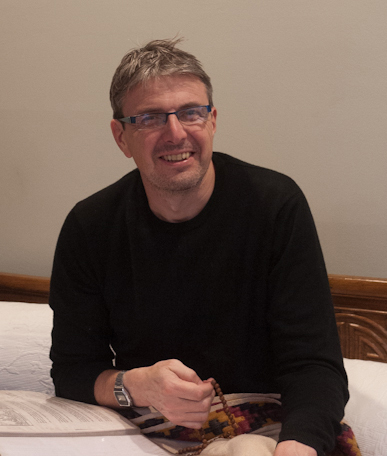
Simon Houlton
Institute of Buddhist Dialectics
Simon began studying the Dharma in India in 1996. In 2000 he joined the Dharma and Tibetan language classes at the Library of Tibetan Works and Archives and then lived for three years in Drepung Loseling monastery in South India improving his Tibetan and learning the basics of debate. In 2007 he enrolled as a full-time student at the Institute of Buddhist Dialectics in McLeod Ganj and is now in the Abhidharma class, having completed ten years of the 16-year Rime Geshe degree of study. His interests lie in how to study in a nonsectarian manner and the larger project of transmission of Buddhism to the west.

Thomas Doctor
Dharmachakra Translation Committee
Thomas Doctor has studied Buddhist philosophy at Ka-Nying Shedrub Ling Monastery in Kathmandu since the late 1980s. He teaches in the Rangjung Yeshe Institute graduate program and works for the Dharmachakra Translation Committee (DTC). Thomas received his BA and MA degrees in Tibetan Studies from the University of Copenhagen and his PhD in Buddhist Studies from the University of Lausanne. He is the author of Reason and Experience in Tibetan Buddhism: Mabja Jangchub Tsöndrü and the Traditions of the Middle Way (Routledge 2013). With DTC he has translated sūtras and tantras for the 84000 Project, as well as classics of Buddhist philosophy, such as Ornament of Reason (Mūlamadhyamakakārikā with commentary by Mabja Jangchub Tsöndrü, Snow Lion 2011) and Ornament of the Great Vehicle Sūtras (Mahāyānasūtrālaṃkāra with commentaries by Khenpo Shenga and Ju Mipham, Shambhala 2014).
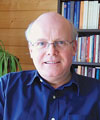
Wulstan Fletcher
Padmakara Translation Group; Tsadra Foundation Fellow
Wulstan Fletcher studied modern languages and theology in Oxford and Rome. He completed a three year meditation retreat in Chanteloube, France 1986-1989 and is a member of the Padmakara Translation Group. He has been a Tsadra Fellow since 2001. Wulstan has completed several Tibetan-English translation projects in collaboration with Helena Blankleder, including The Wisdom Chapter: Jamgön Mipham’s Commentary on the Ninth Chapter of The Way of the Bodhisattva (2017), Treasury of Precious Qualities (Book 1, 2010; Book 2, 2013), The Root Stanzas of the Middle Way (2008), The Way of the Bodhisattva (revised 2006), The Nectar of Manjushri’s Speech (2007), White Lotus (2007), Introduction to the Middle Way (2005), The Adornment of the Middle Way (2005), Food of Bodhisattvas: Buddhist Teachings on Abstaining from Meat (2004), and Counsels from My Heart (2003). Wulstan is currently working on Longchenpa’s sems nyid ngal gso and Mipham’s brgal lan nyin byed snang ba.
Tom Yarnall
AIBS; Columbia University
Dr. Tom Yarnall is an Associate Research Scholar and Adjunct Professor at Columbia University, where he specializes in Indo-Tibetan Buddhism. He works with the Columbia Center for Buddhist Studies and the American Institute of Buddhist Studies as the Executive Editor for the “Treasury of the Buddhist Sciences” series. Dr. Yarnall began his engagement with Buddhism in the late 70s, studying with Tibetan Lamas from all four orders while earning a BA in Religion at Amherst College in 1983. He later earned an MA, MPhil, and ultimately a PhD from Columbia University in 2003. Dr. Yarnall’s own scholarly work has focused on Mādhyamika philosophy, Buddhist ethics, and Tantric materials of the Unexcelled Yoga class. His study and translation of the creation stage chapters of Tsong Khapa’s Great Treatise on the Stages of Mantra (sngags rim chen mo) was published in the “Treasury of the Buddhist Sciences” series in 2013.
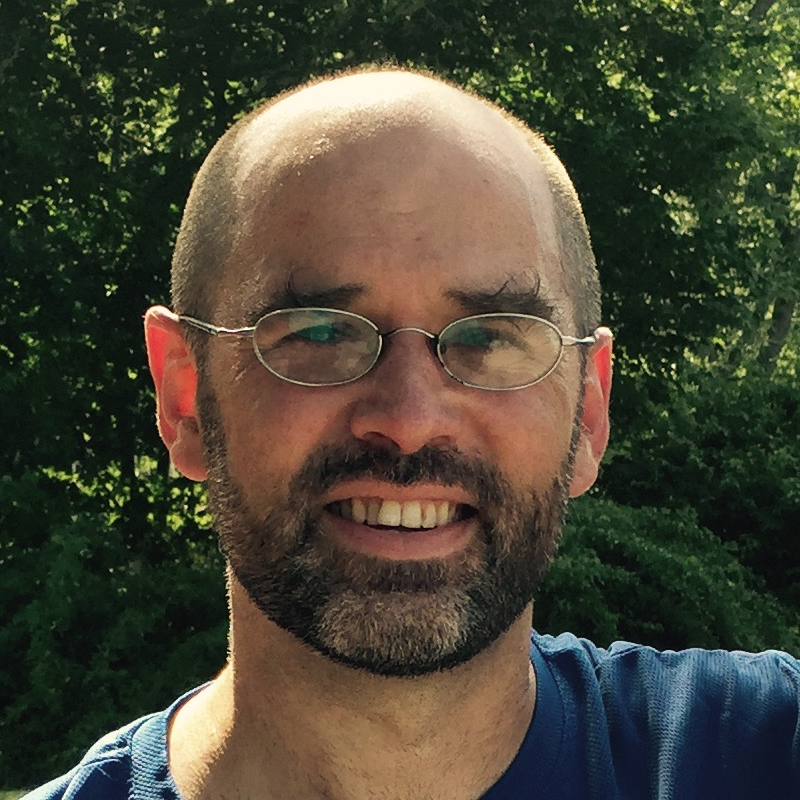
Matt Weiss
Sera Je
Matt has had a long-time interest in Tibetan Buddhism and began formally studying Tibetan language and debate manuals in 1997. From 2007 to 2014 he lived in Sera Jhe monastery, enrolled in the Geshe program for six years. In addition, while studying in Sera Jhe, he taught physics to monks as part of a science initiative. During his studies in India he became very interested in Madhyamaka and its approach to systematic philosophy and this continues to be a topic of personal interest and research. Before traveling to India he earned a bachelor’s degree in physics and masters degree in applied mathematics.
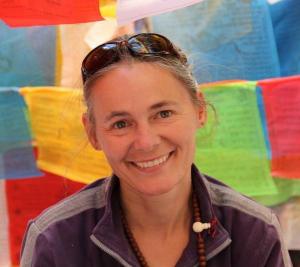
Heidi Nevin
Independent
Heidi Nevin studied Tibetan language at Manjushri Center for Tibetan Culture (1996-8); apprenticed to Kyabje Chatral Rinpoche (1996-2003); served Lama Tharchin by helping to translate the mkha’ ‘gro thugs thig (Vol. Ma of Dudjom Rinpoche’s Collected Works) and other texts (2006-present). She translated the autobiography of Khenpo Ngakchung (Wondrous Dance of Illusion, Shambhala, 2013, restricted text) and is currently translating volume one of Dungse Trinley Norbu Rinpoche’s three-volume Collected Works. Heidi lives in Corvallis, Oregon, USA.
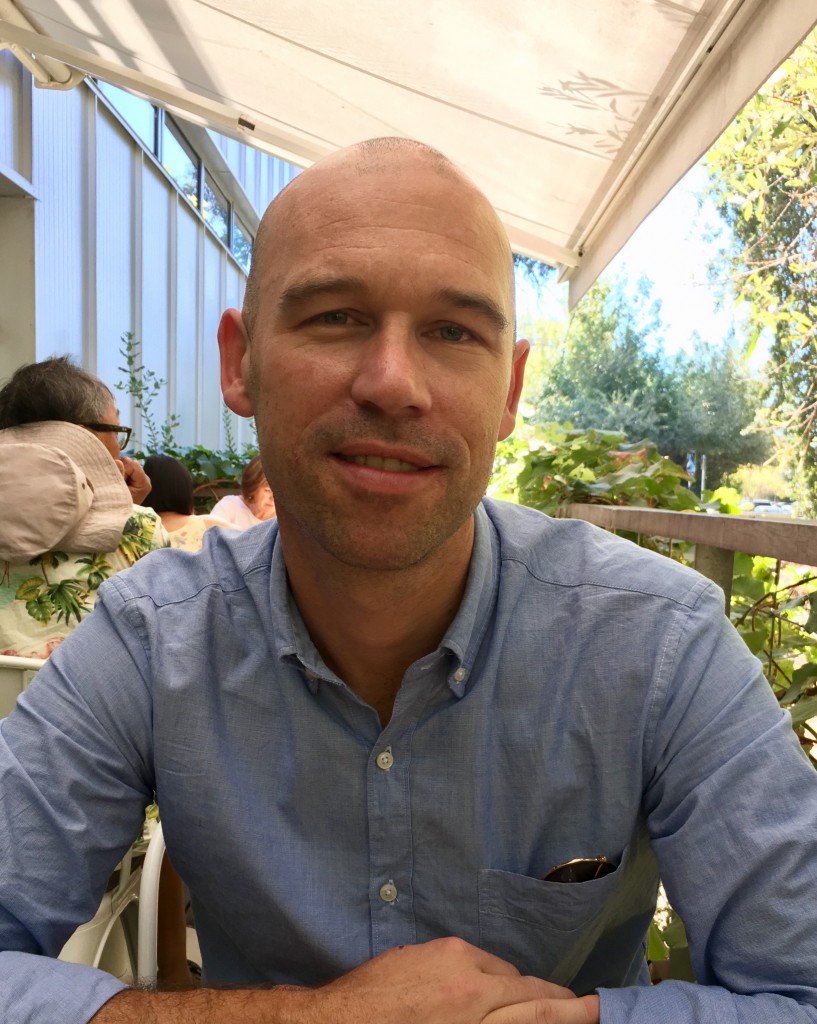
Robert Miller
Berkeley
Robert Miller began working as an interpreter in 2000 under the guidance of Gyume Khensur Rinpoche, Geshe Tashi Tsering at Chenrezig Institute in Australia. In 2007, Garje Khamtrul Rinpoche appointed him Director of Education at Lhundrub Chime Gatsal Ling, a Nyingma monastery near Dharamsala. Since resigning his position in 2015, Robert has begun a PhD with the Group in Buddhist Studies at the University of California-Berkeley. His most recent translations, done under the auspices of 84000, include several chapters from the Vinayavastu, a massive work on monastic community life found in the Mūlasarvāstivāda Vinaya.
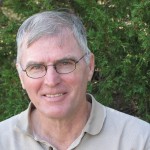
Ken McLeod
Unfettered Mind
A student and practitioner of Buddhism for over 40 years, Ken McLeod left academia after completing his MA in mathematics. He served as Kalu Rinpoche’s interpreter on his first two North American teaching tours (1972 and 1974-5). Subsequently, he completed two three-year retreats and was then sent to Los Angeles to teach. After Kalu Rinpoche’s passing, Ken established Unfettered Mind in Los Angeles as a place for those whose path lies outside established institutions. Currently his interest is in the translation of teaching poems and prayers. His books include The Great Path of Awakening (1987), Wake Up to Your Life (2001), An Arrow to the Heart (2007), Reflections on Silver River (2014), and A Trackless Path (2016).
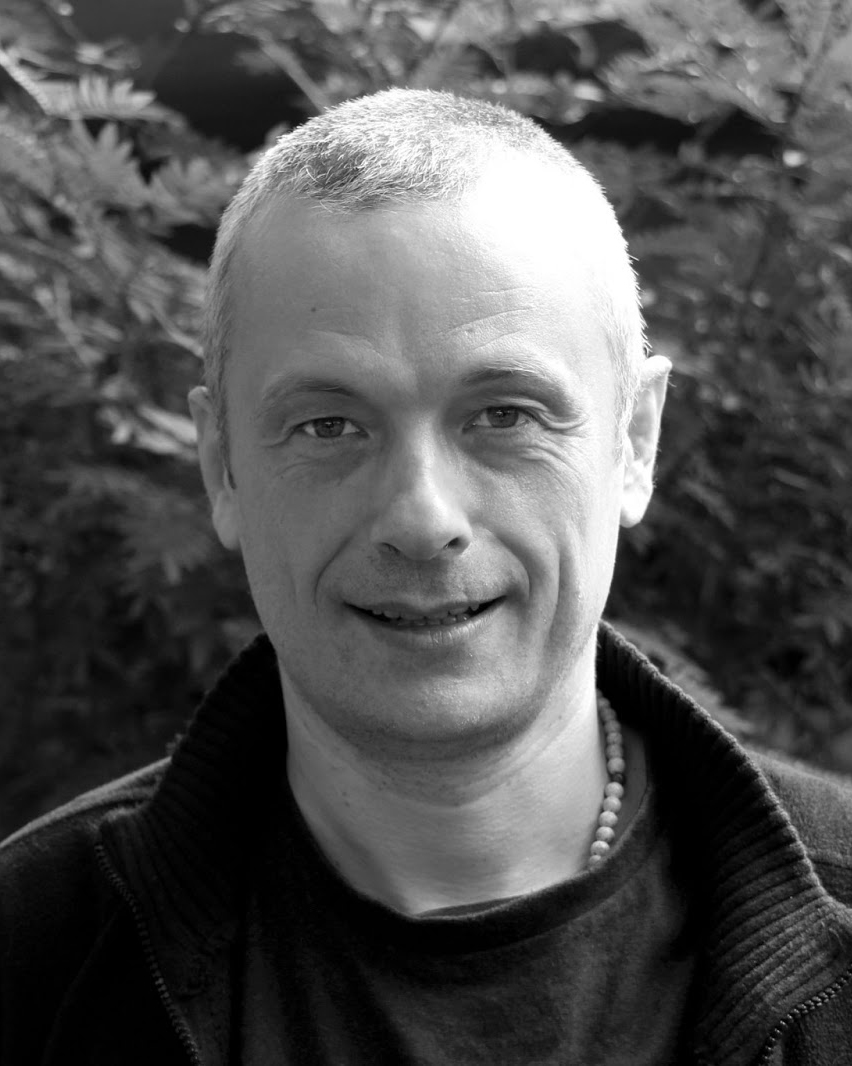
Gerd Klintschar
Rangjung Yeshe Institute
Gerd Klintschar earned a PhD in chemistry from the University of Graz and went on to work in the pharmaceutical industry in development and marketing. He began his involvement with Buddhism in the late nineties. In 2008 he moved to Nepal to complete both BA and MA degrees in Buddhist Studies at the Rangjung Yeshe Institute. After completing these programs he moved on to study in the monastic college of Ka-Nying Shedrub Ling Monastery, where he is currently in his fifth year.
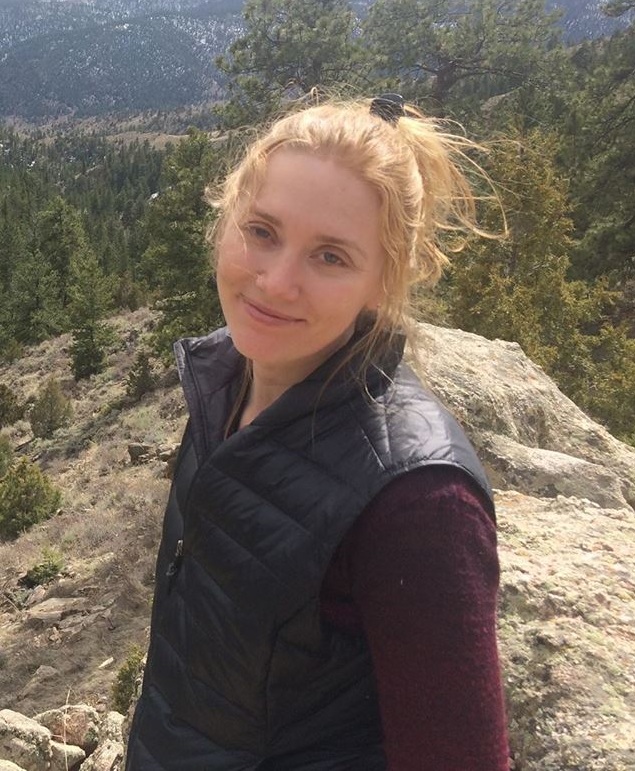
Casey Kemp
Shambhala Publications
Casey Kemp is a translator and editor of Buddhist texts. She received her Master’s degree from Oxford University in Tibetan Buddhist philosophy, and has worked closely with the Drikung Kagyu monastic community in Europe and Asia. She is completing her PhD dissertation on the concept of luminosity in the early Tibetan Mahāmudrā tradition through the University of Vienna and has translated and edited for 84000. She currently resides in Boulder working as a Snow Lion editor at Shambhala Publications.
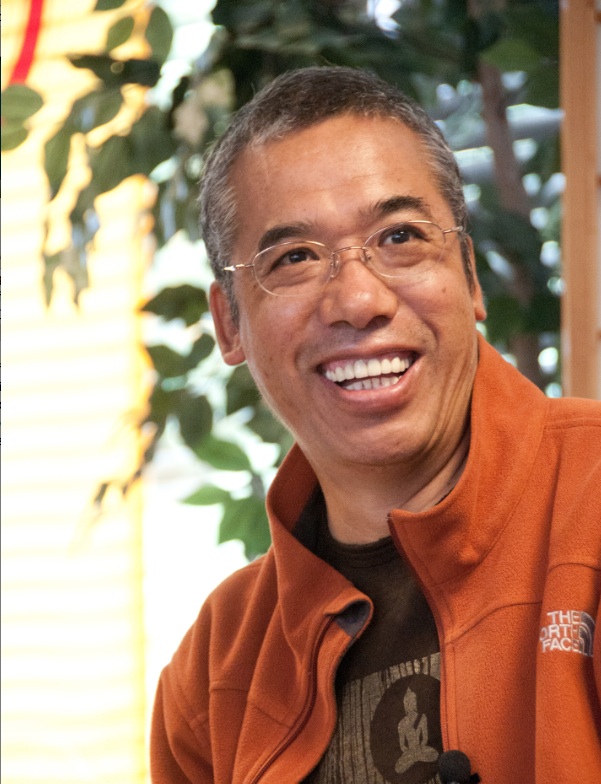
Acharya Lama Tenpa Gyaltsen
Nitartha Institute; Naropa University
Acharya Lama Tenpa Gyaltsen graduated from Karma Shri Nalanda Institute at Rumtek Monastery in Sikkim, India, together with Dzogchen Ponlop Rinpoche. He completed his studies with an Acharya degree in 1991 and following his graduation taught Buddhist philosophy at the Institute for two years. Under the guidance of Khenpo Tsultrim Gyamtso Rinpoche, he then entered a three-year retreat in Pullahari, Nepal. He was a resident teacher in Hamburg, Germany, before becoming a professor of Buddhist Studies at Naropa University.
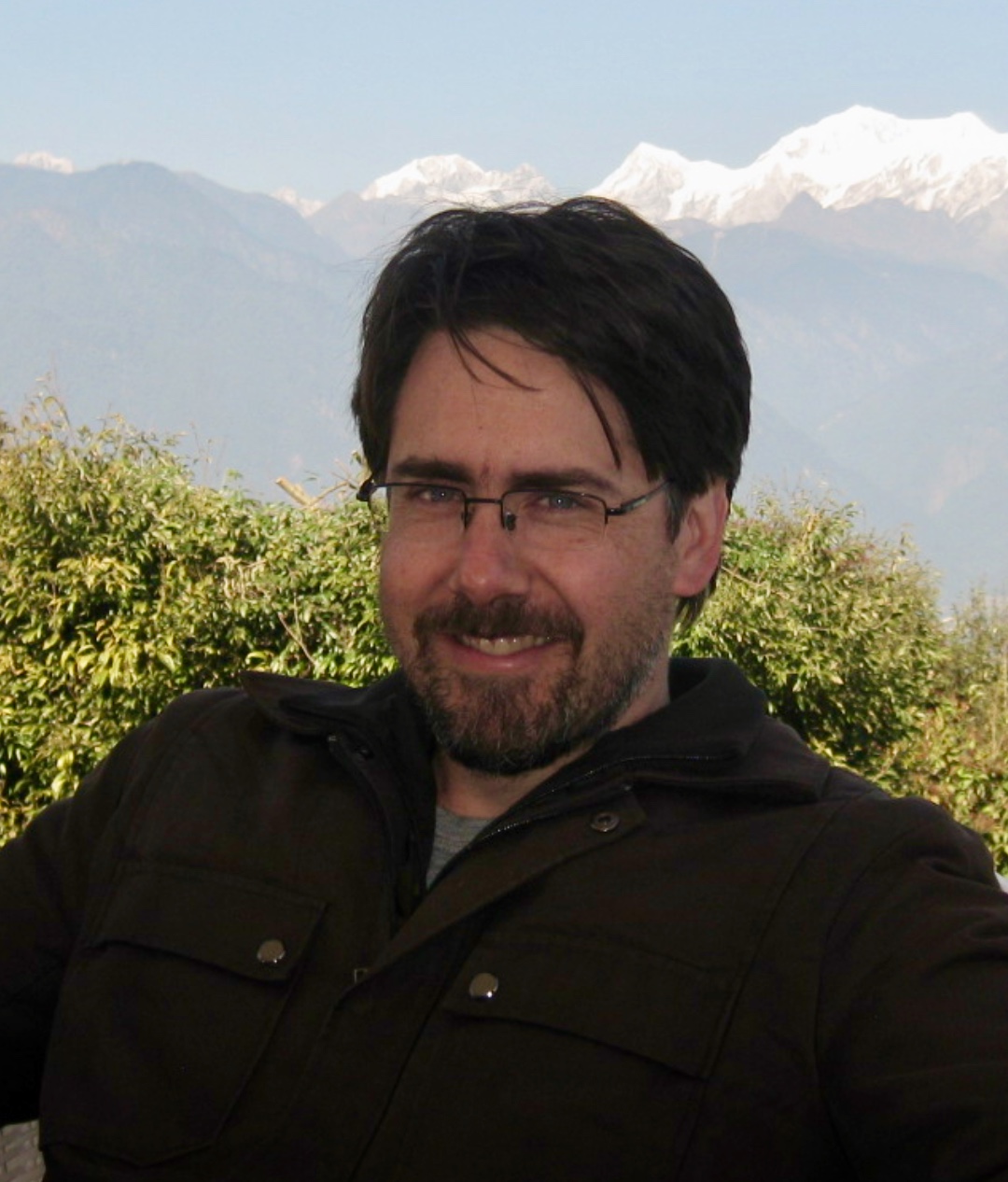
James Gentry
84000; Rangjung Yeshe Institute
James D. Gentry is a scholar of Tibetan religion, culture, and society. In his PhD dissertation completed at Harvard University he studied the roles of sacred objects, such as relics, amulets, and other sacra, in the lives of Tibetan Buddhists, now available as a tome from Brill’s Tibetan Studies Library, Power Objects in Tibetan Buddhism: The Life, Writings, and Legacy of Sokdokpa Lodrö Gyeltsen. James’s research has led him to live in the Himalayan foothills of Nepal, Tibet, China, and India for nearly eight years. He has worked as an assistant professor at Kathmandu University’s Center for Buddhist Studies at Rangjung Yeshe Institute and is currently a lecturer at the University of Virginia.
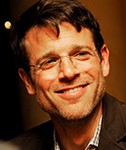
Alexander Gardner
Conference Facilitator; Treasury of Lives
Alexander Gardner is the Director and Chief Editor of the Treasury of Lives, an online biographical encyclopedia of Tibet and the Himalayan Region. He completed his PhD in Buddhist Studies at the University of Michigan in 2007. From 2007 to 2016 he worked at the Shelley & Donald Rubin Foundation, serving as their Executive Director from 2013 to 2016. His research interests are in Tibetan life writing and the cultural history of Kham in the nineteenth century.
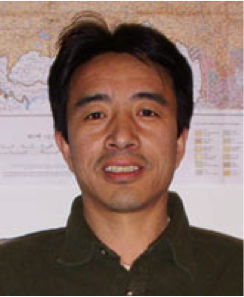
Gendun Rabsal
Independent
Gendun Rabsal teaches at Indiana University and his life goal is to contribute to preserving and promoting the advancement and flourishing of Tibetan literature and language. With these concepts in mind, he has chosen to devote his career to teaching, writing, researching, and translating so that Tibetan language can flourish in today’s world.
Holly Gayley
University of Colorado, Boulder
Holly Gayley is Assistant Professor of Buddhist Studies at the University of Colorado, Boulder. Her research focuses on the revitalization of Buddhism in the Tibetan region of Golok since the 1980s. She completed her Masters in Buddhist Studies at Naropa University in 2000 and PhD at Harvard University in Tibetan and Himalayan Studies in 2009. Currently, she is finalizing a manuscript on the life and love letters of the contemporary female tertön, Khandro Tāre Lhamo, and her consort Namtrul Rinpoche and translating texts of advice to the laity by Khenpo Jigme Phuntsok and his successors at Larung Buddhist Academy in Serta. In 2013, Holly co-organized the conference, “Translating Buddhist Luminaries,” which brought translators and scholars into a conversation about the art of translation in relation to pithy texts of advice by nineteenth century ecumenical masters such as Patrul Rinpoche, Ju Mipham, and Jamgön Kongtrul. The translations will appear in an edited volume with Wisdom Publications.

Andrew Quintman
Yale University
Quintman is associate professor in the Department of Religious Studies at Yale University, specializing in the Buddhist traditions of Tibet and the Himalaya. For seven years he served as the academic director of the School for International Training’s Tibetan Studies program based in Kathmandu. He is the author of The Yogin and the Madman: Reading the Biographical Corpus of the Great Tibetan Saint Milarepa (Columbia University Press 2014). His English translation of The Life of Milarepa (2010) was published in the Penguin Classics series. He is currently writing a history of Drakar Taso Monastery in Tibet southern borderland and a study of the Buddha’s life story through the visual and literary materials of Jonang Monastery in western Tibet.
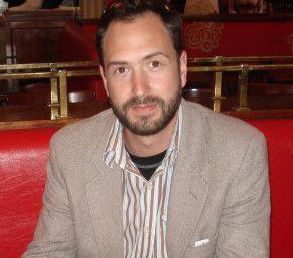
Marcus Perman
Tsadra Foundation
Marcus Perman is the Director of Research at Tsadra Foundation, a nonprofit trust established to provide vital funding for the combined study and practice of Tibetan Buddhism in the west. Marcus graduated from St. Lawrence University with honors in Psychology and Philosophy and graduated from Naropa University with an MA in Indo-Tibetan Buddhism, focusing on Tibetan and Sanskrit languages. He studied extensively at Nitartha Institute and from 2007 to 2008 he studied at Tibet University in Lhasa. Marcus has been developing a specialized library for Tibetan Buddhist translators in Boulder, Colorado and is the organizer of the Translation & Transmission Conference series.
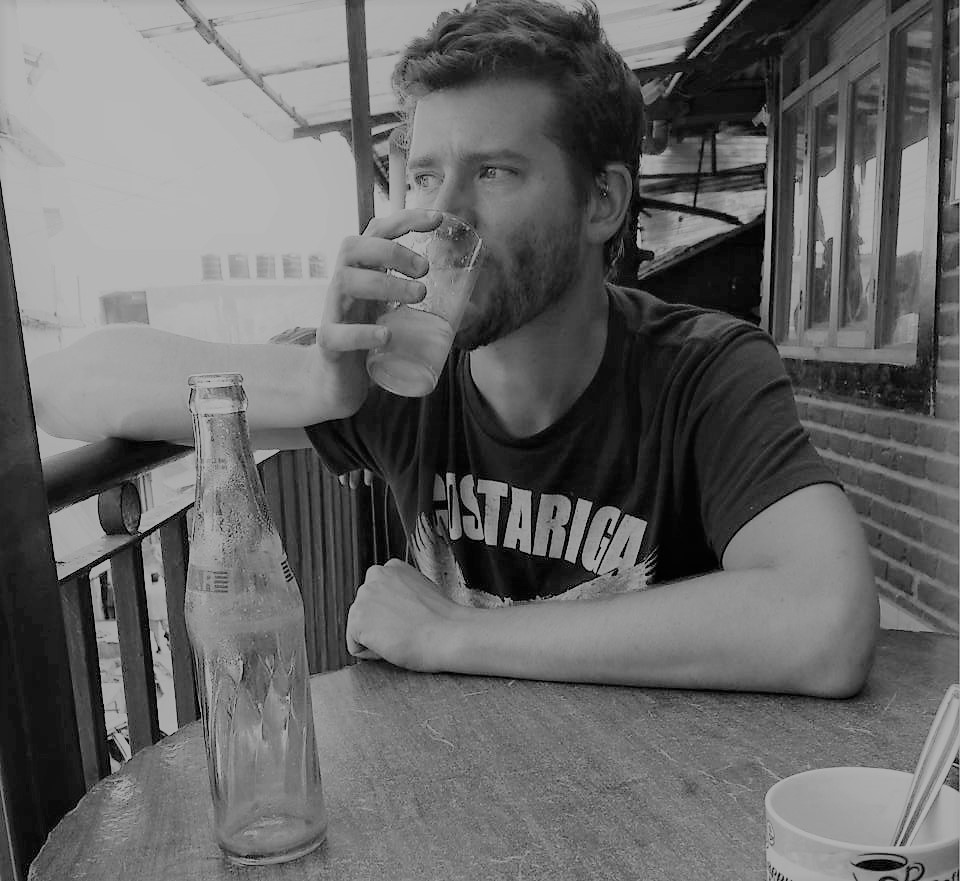
Dirk Schmidt
Esukhia
Dirk Schmidt is a researcher at Esukhia. His focus is applied linguistics for Tibetan language education.

Susan Bassnett
University of Warwick
Susan Bassnett is Professor of Comparative Literature at the University of Warwick and has just been appointed Special Adviser in Translation Studies for a three-year period attached to the School of Modern Languages and Cultures. She established postgraduate programmes in Comparative Literature and then in Translation Studies at the University of Warwick where she also served twice as Pro-Vice-Chancellor. She continues to lecture and run workshops around the world and her current research is on translation and memory. She is an elected Fellow of the Institute of Linguists, elected Fellow of the Royal Society of Literature and a Fellow of the Academia Europaea. In recent years she has acted as judge of a number of major literary prizes including the Times/Stephen Spender Poetry in Translation Prize, the Independent Foreign Fiction Prize and the IMPAC Dublin prize. She is also known for her journalism, translations and poetry.

Eric Colombel
Tsadra Foundation (President and Founder)
Eric Colombel is the president and founder of Tsadra Foundation, a nonprofit trust established in 2000 to provide vital funding for the combined study and practice of Tibetan Buddhism in the west. He has been a student of Buddhism from the age of 17, studying the Tibetan language at INALCO in Paris and Buddhist theory and practice at various Buddhist centers, receiving teachings and transmissions from teachers of all the principal Tibetan traditions. Educated in IT, as a young student in Paris he created the first digital script for the Bhutanese Dzong-kha language system. Later in New York he was instrumental in developing the digital architecture for the then radically new Asian Classics Input Project. In 2000 he decided to use a western philanthropic model as a means for contributing to the furthering of wisdom and compassion in Western minds through the creation of Tsadra Foundation.

Brandon Dotson
Georgetown University
Brandon Dotson has worked and taught at Oxford University, the School of Oriental and African Studies, the University of California at Santa Barbara, LMU München, and now Georgetown University. His research on ritual, history, narrative, and text has taken him to Nepal, Tibet, and China. Dotson’s PhD thesis (2007) is a study of Tibet’s earliest extant corpus iuris, and his first monograph (2009) is a translation and study of Tibet’s earliest historical and bureaucratic record, the Old Tibetan Annals. His postdoctoral research focused on the origins of Tibetan historical narrative and its relationship with ritual narrative, including divination. The results of this research include an annotated translation of the Old Tibetan Chronicle, Tibet’s first and only chronicle epic, which formed the basis of Dotson’s Habilitationsschrift at LMU München in 2013.
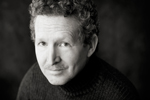
Donald Lopez, Jr.
University of Michigan
Donald Lopez is the Arthur E. Link Distinguished University Professor of Buddhist and Tibetan Studies at the University of Michigan, where he is chair of the Department of Asian Languages and Cultures. He was elected to the American Academy of Arts and Sciences in 2000. His most recent translations, both with Thupten Jinpa, are Grains of Gold: Tales of a Cosmopolitan Traveler (the Gtam rgyud gser gyi thang ma of A mdo Dge ’dun chos ’phel) and Ippolito Desideri’s refutation of rebirth and emptiness, Dispelling the Darkness: A Jesuit’s Quest for the Soul of Tibet. Forthcoming translations include the grub mtha’ of Lcang skya rol pa’i rdo rje.
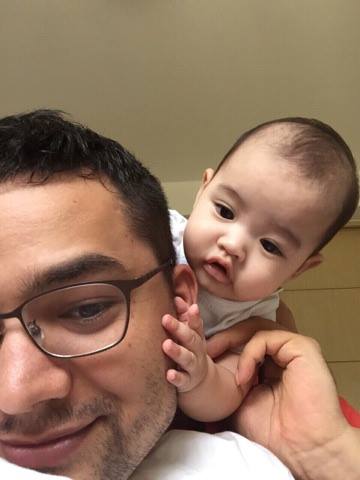
Ngawang Trinley
Esukhia
Ngawang was born in 1986 in Nyima Dzong Buddhist center in France. In 2002 he moved to Asia to study Tibetan and studied at Shechen Shedra, as well as undertaking dkar rtsis studies at Sherabling. He has been studying Tibetan Medicine since 2008. In 2011 he started Esukhia in France, and then in 2012 he started Esukhia in India. Esukhia is a registered NGO dedicated to the preservation of the Tibetan language through education, language services, and research & development. He has translated bkra shis chen po’i mdo.
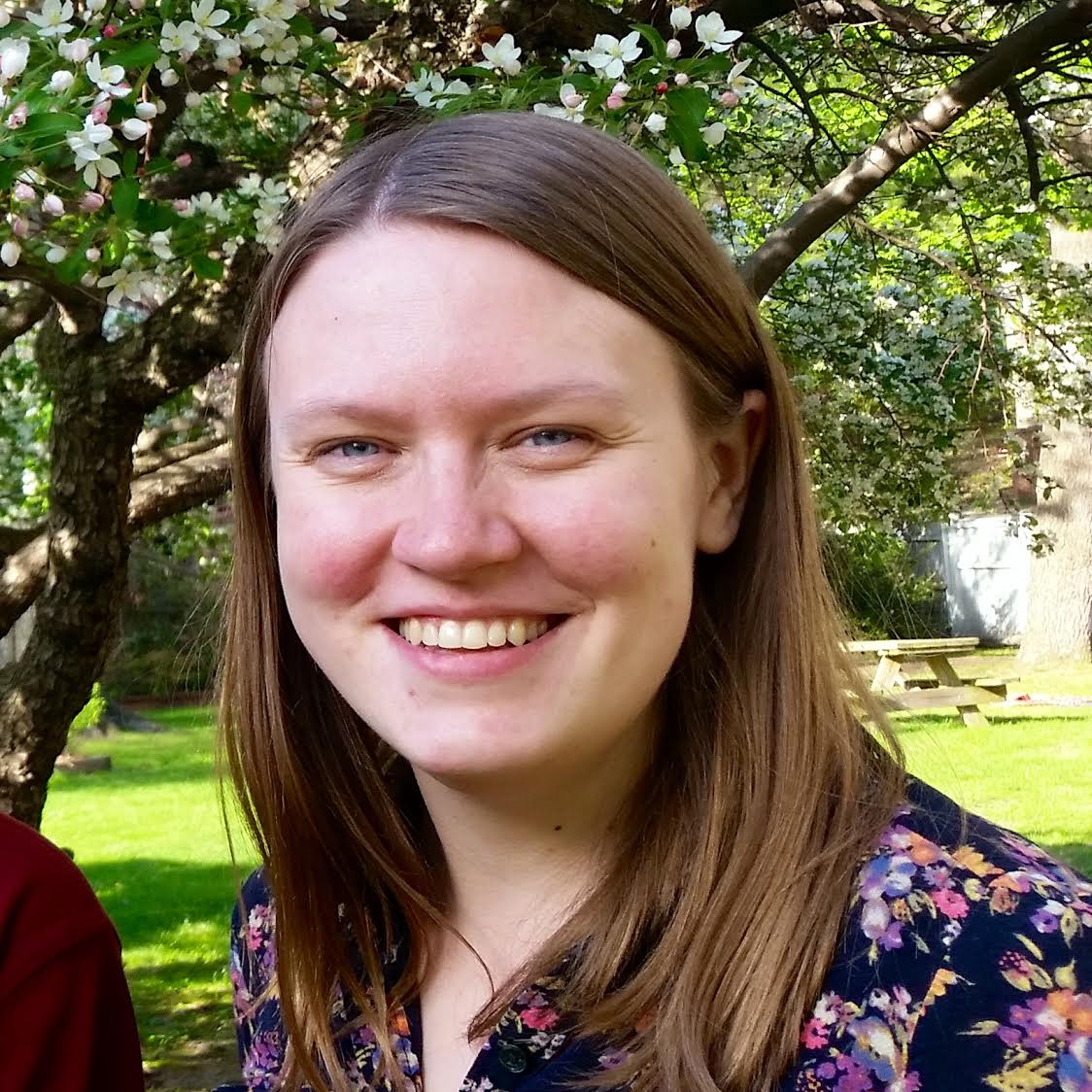
Brianna Quick
Wisdom Publications
Brianna Quick is an assistant editor at Wisdom Publications in Somerville, Massachusetts. She has been with Wisdom for two years and primarily creates content for Wisdom Academy’s online courses and helps coordinate the acquisitions committee. She received a master of divinity degree from Harvard Divinity School in 2015, where she concentrated in Buddhist studies. She completed her undergraduate studies at Warren Wilson College in Asheville, North Carolina and has practiced in the Drikung Kagyu lineage for several years.
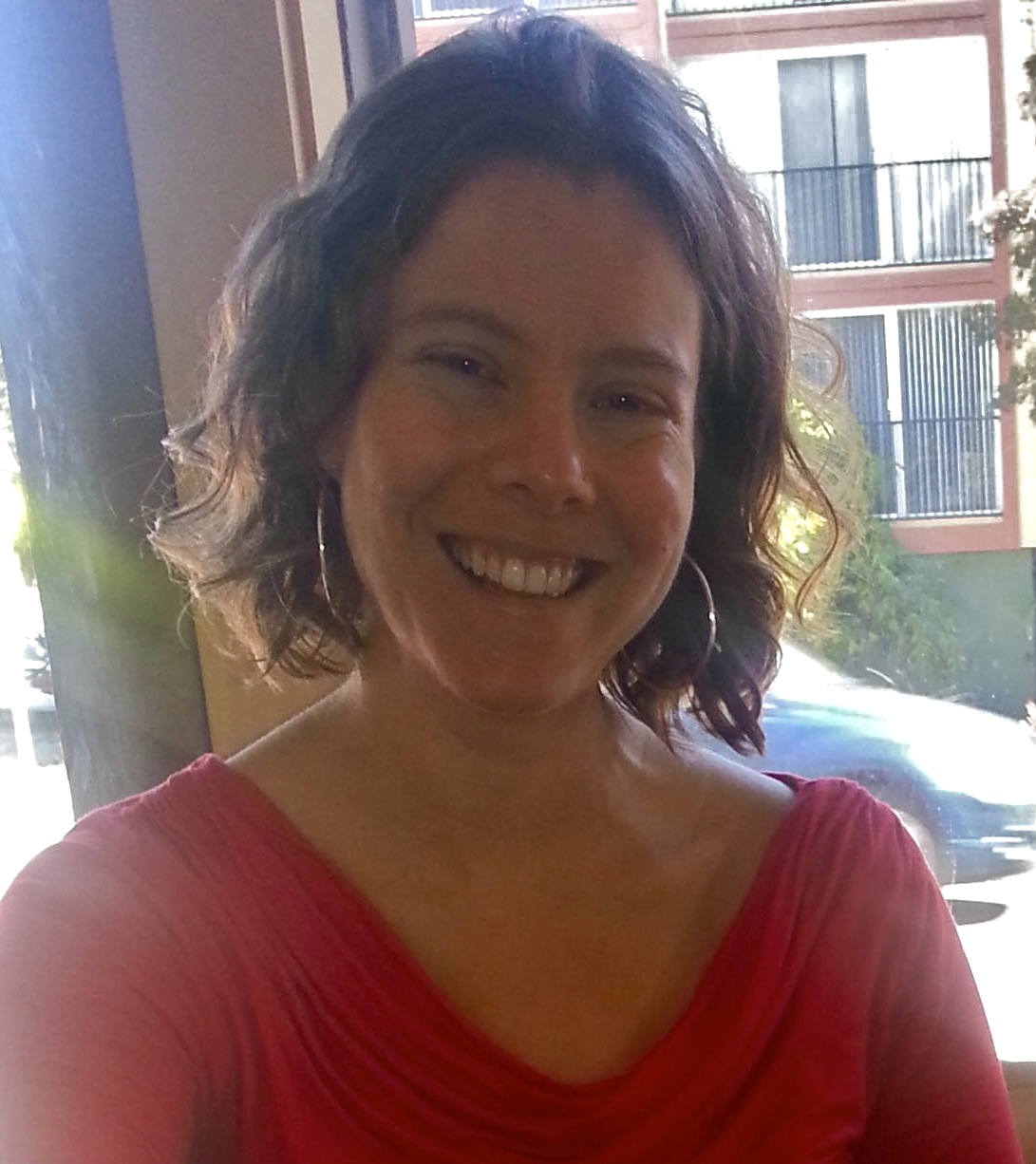
Catherine Dalton
Dharmachakra Translation Committee; UC Berkeley
Catherine is an oral interpreter and a translator for the Dharmachakra Translation Committee. She has published a number of translations with Dharmachakra, including several for 84000. Catherine studied and taught at the Rangjung Yeshe Institute in Nepal for a number of years, and is the co-director of the Dharmachakra Center for Translation and Translation Studies at Rangjung Yeshe Gomde, CA. She holds an MA in Buddhist Studies from Kathmandu University, and is currently a doctoral student in Buddhist Studies at UC Berkeley.
David Germano
University of Virginia
David Germano teaches and researches Tibetan and Buddhist Studies at the University of Virginia, and is director of the Tibetan and Himalayan Library, the Tibet Center, the UVa Contemplative Sciences Center, the Tibet Participatory Culture Initiative, and SHANTI (Social Sciences, Humanities, and Arts Network of Technological Initiatives). His personal scholarship focuses on the history of Tibetan culture and Buddhism from the ninth to fourteenth century with a special focus on esoteric religious movements. With the Tibet Center he has directed exchange programs between China and the US in relationship to Tibetan communities. Under the Tibet Participatory Culture Initiative, he is working to use technology to support bridges between academics and development projects, and to enable local communities to use modern tools as vehicles for their own self-expression and empowerment. At UVa, he is coordinating a pan-University exploration of contemplation in learning and research. Germano is currently working on a fourfold set of works on the Great Perfection Seminal Heart (rdzogs chen snying thig) tradition.
Ringu Tulku
Bodhicharya International
Ringu Tulku Rinpoche is a Tibetan Buddhist Master of the Kagyu Order. He was trained in all schools of Tibetan Buddhism under many great masters including H.H. the Sixteenth Gyalwang Karmapa and H.H. Dilgo Khyentse Rinpoche. He took his formal education at Namgyal Institute of Tibetology, Sikkim and Sampurnananda Sanskrit University, Varanasi, India. He served as Tibetan Textbook Writer and Professor of Tibetan Studies in Sikkim for twenty-five years. Since 1990, he has been traveling and teaching Buddhism and meditation in Europe, America, Canada, Australia, and Asia. He participates in various interfaith and ‘Science and Buddhism’ dialogues and is the author of a number of books on Buddhist topics. These include Path to Buddhahood, Daring Steps, The Ri-me Philosophy of Jamgön Kongtrul the Great, Confusion Arises as Wisdom, the Lazy Lama series and the Heart Wisdom series, as well as several children’s books, available in Tibetan and European languages.
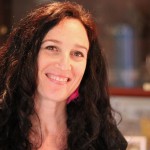
Sarah Plazas
Ewam and Namchak
Sarah has been a practicing Buddhist since 1999, and has been studying the Tibetan language since 2002. She lived at the Garchen Buddhist Institute in Arizona for five years, completing the first three-year retreat there. Sarah studied at the Rangjung Yeshe Institute in Nepal in their translator training program. Her main teachers are Garchen Rinpoche, Lama Tharchin Rinpoche, and Tulku Sang ngag Rinpoche. Sarah served as Tulku Sang ngag Rinpoche’s personal interpreter for five years, and Lama Tharchin Rinpoche’s interpreter for the last year of his life. Sarah has worked with the Namchak Foundation for the past two years, translating the corpus of Tsasum Linga’s Namchak cycle with Richard Barron. She translated Luminous Moonlight: The Life of Do Dasal Wangmo.

Yeshe Gyamtso (Peter O’Hearn)
Kunzang Palchen Ling, NY
Yeshe Gyamtso completed two three-year retreats in the 1980s at Kagyu Thubten Chöling in Wappingers Falls, NY. Since then he has taught, interpreted for several Tibetan Buddhist teachers, translated a number of biographies of Buddhist historical figures, and written two books on Buddhist practice. Recent translations include Luminous Clarity (2016), Shower of Blessings (2015), and Siddhas of Ga (2013).
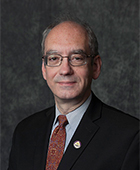
Chuck Lief
Naropa University
Boulder, Colorado; JD, University of Colorado, School of Law; BA, Brandeis University
Charles G. Lief was named the 7th president of Naropa University in 2012 after a deep forty-year affiliation with Naropa—first as a student of Naropa’s founder, Chögyam Trungpa Rinpoche, then as a lawyer for the university, and later as chairman of the board. He has participated in some of the earliest discussions that culminated in the creation of the Naropa Institute in 1974.
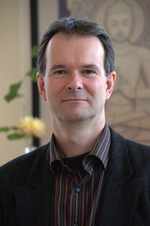
Karl Brunnhölzl
Nitartha Translation Network
Karl was originally trained, and worked, as a physician for twenty years. He took Buddhist refuge vows in 1984, and received his Buddhist and Tibetan language training mainly at Marpa Institute For Translators in Kathmandu, Nepal. He also studied at Hamburg University, Germany. Karl has served as a translator, interpreter, and Buddhist teacher mainly in Europe, India, and Nepal, and has acted as one of the main translators and teachers at Nitartha Institute. In addition, he regularly taught at Gampo Abbey’s Vidyadhara Institute. He is the author of several books on Buddhism, such as The Center of the Sunlit Sky, Straight from the Heart, In Praise of Dharmadhātu, Gone Beyond, Mining For Wisdom Within Delusion, and The Heart Attack Sutra. He currently lives in Seattle. He also teaches weekend seminars and Nitartha Institute courses in Nalandabodhi centers, mainly in the US, Canada, and Mexico.
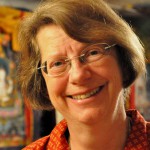
Elizabeth Napper
UMA Institute of Tibetan Studies
Elizabeth Napper began studying Tibetan in 1970. She studied in Wisconsin, Tibet, India (Sanskrit University), and at the Tibetan Buddhist Learning Center, the University of Virginia, where she received a PhD in 1985. She is the director of the Tibetan Nuns Project in India and the USA. She has translated lo rig (Mind in Tibetan Buddhism, Snow Lion, 1980) and major portions of Tsong kha pa’s lam rim chen mo, which was published as the Great Treatise on the Stages of the Path to Enlightenment, (3 volumes, Snow Lion, 2000, 2002, 2004). At present she is working on sa lam, a long chen nying tik ngon dro text, and Sakya practice texts.
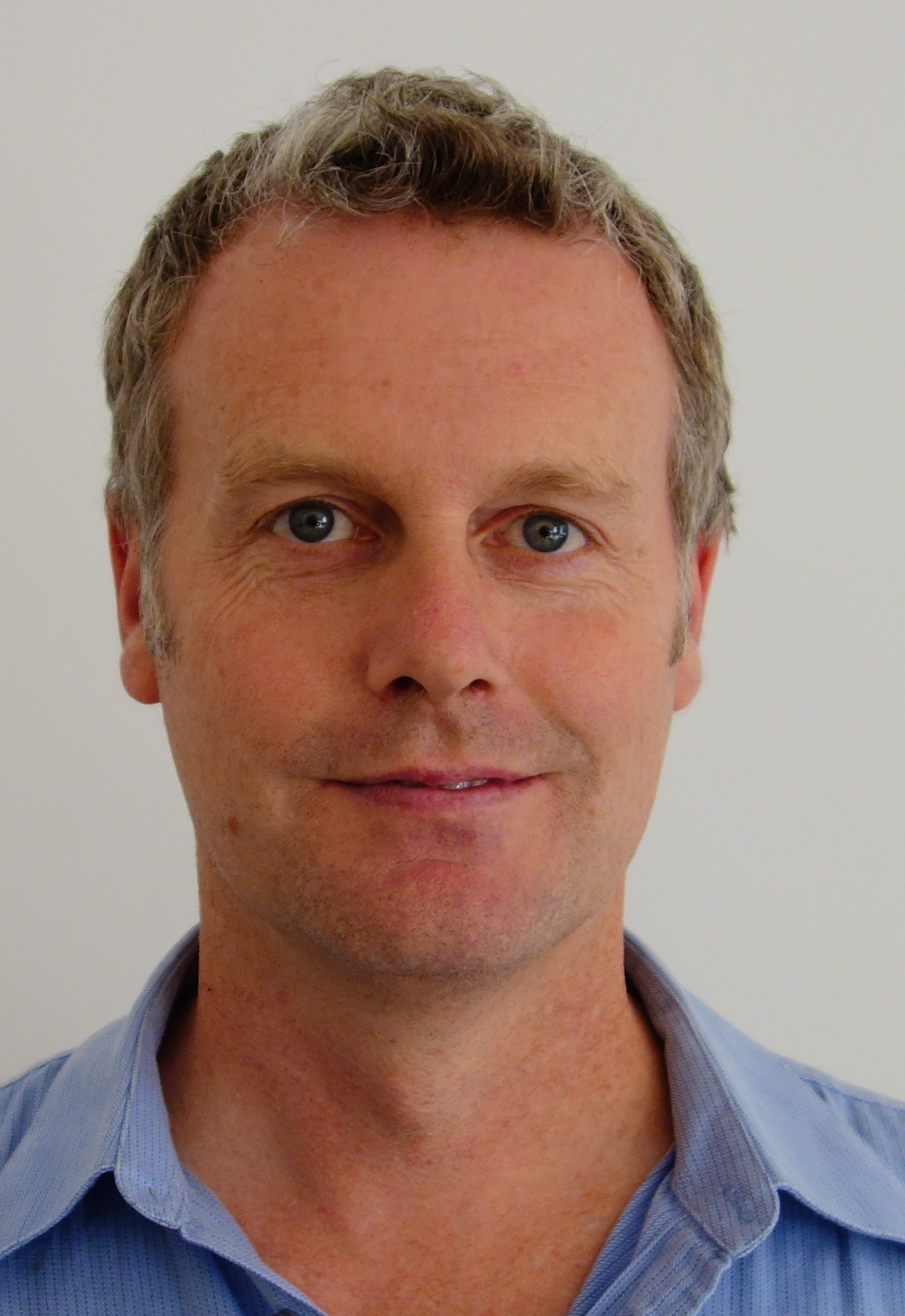
Jacob Dalton
University of California, Berkeley
Jacob Dalton, Associate Professor and Khyentse Foundation Distinguished Professor of Tibetan Buddhism, received his PhD in Buddhist Studies from the University of Michigan in 2002. After working for three years (2002-05) as a researcher with the International Dunhuang Project at the British Library, he taught at Yale University (2005-2008) before moving to Berkeley. He works on Nyingma religious history, tantric ritual, early Tibetan paleography, and the Dunhuang manuscripts. He is the author of The Taming of the Demons: Violence and Liberation in Tibetan Buddhism (Yale University Press, 2011) and co-author of Tibetan Tantric Manuscripts from Dunhuang: A Descriptive Catalogue of the Stein Collection at the British Library (Brill, 2006). He is currently working on a study of tantric ritual in the Dunhuang manuscripts. His most recent translation work has focused on the recently discovered biographies of two tenth-century Tibetan figures: Nupchen Sangye Yeshe and Lha Lama Yeshe Ö.
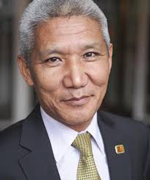
Thupten Jinpa
Institute of Tibetan Classics
Thupten Jinpa, PhD, received his early education as a monk and obtained the Geshe Lharam degree from Ganden Monastic University in South India. He holds a B.A. in philosophy and a PhD in religious studies, both from Cambridge University. Jinpa is an adjunct professor at McGill University. He is associated with the Center for Compassion and Altruism Research and Education at Stanford University, and is the main author of its Compassion Cultivation Training program. He is the board chair of the Mind and Life Institute, the founder and president of the Institute of Tibetan Classics, and the general editor for The Library of Tibetan Classics. Since 1985 he has been the principal English translator to H.H. the Dalai Lama. Jinpa’s published works include translations of numerous books by the Dalai Lama, Songs of Spiritual Experience, Mind Training: The Great Collection, and The Book of Kadam. His Tibetan publications include a first ever introduction to Buddhism in vernacular Tibetan and a comprehensive modern Tibetan grammar. Most recently he co-translated Grains of Gold by Gendün Chöpel.
Art Engle
Tsadra Foundation Fellow
Artemus B. Engle began studying the Tibetan language in Howell, New Jersey in early 1971 at Labsum Shedrup Ling, the precursor of the Tibetan Buddhist Learning Center. In 1972 he became a student of Sera Mey Khensur Lobsang Tharchin Rinpoche, a relationship that spanned more than thirty years. In 1975 he enrolled in the Buddhist Studies program at the University of Wisconsin in Madison and received a PhD in 1983. Since the mid 1980s he taught Tibetan language and Buddhist doctrine at the Mahayana Sutra and Tantra Center in Howell, New Jersey. In 2005 he became a Tsadra Foundation Translation Fellow and has worked primarily on the Pañcaskandhaprakarana and the Bodhisattvabhūmi.

